
- [076] Newspaper
War in Hong Kong Everybody knows that the newspaper market in
Hong Kong has been shaken up by the entry of two new free newspapers into
the market. In response, The Sun has cut down its retail price from
HK$6 to HK$3 plus free retail coupons.
InMediaHK
quotes: "Just after noontime, The Sun has sold out at many
newsstands. The vendors asked the distributors for more copies.
In contrast, there were stacks of the competitor Apple Daily left
unsold. The vendors looked at those stacks in despair and ask the
distributors for fewer copies." I am almost prepared to believe
the hype, until I saw the propaganda photos from The Sun about the consumer
stampede. These photos appeared on different days and were presumably
taken at different locations. For one thing, the people look too posed
when they hold up the retail coupons in such prominence.

More significantly, the people marked by colored circles supposedly appeared
on both days. Look at the man marked by the red circle. Couldn't
he at least wear a different jacket?
- [075] Hong
Kong By The Numbers (Ming Pao via Yahoo!
News) To express dissatisfaction with the government proposal
on political reform and to fight for direct elections in 2007/2008, the
Civil Human Rights Front called for a demonstration at government
headquarters. The organizers claimed 500 attendees, but the police
gave an estimate of 150 persons. The
Standard was even less charitable by saying "more than 100
people."

The CHRF spokesperson said that the number of attendees is
unimportant. Even if the number of demonstrators on the scheduled
December 4 march is small, the government should not use that number to
gauge public opinion. Instead, the spokesperson urged the government
to use a public referendum to determine the future of Hong Kong.
Oh, my! Does this sound like the concession speech? In a
previous comment, I argued for using public
opinion polls instead because it has the highest support level (consistently
around 60% for direct elections). The 12/4 demonstration may involve
less than 1% of the voting population, and a referendum can be doubly
disastrous (low overall turnout as well as being voted down by a heavy
pro-Beijing mobilization).
- [074] The
Hong Kong Broadcasting Authority In the hysterical witch hunt
against TVBS, charges have been thrown at TVBS chairman Norman Leung for
having served as the director of the Government Information Office in the
Hong Kong SAR. As such, he was obviously a trusted member of the
Communist Party and his current assignment is to create unrest in
Taiwan. To someone in Hong Kong, this is bizarre beyond belief.
First of all, Norman Leung was not the director of the Government
Information Office; instead, he was the chairman of the Hong Kong
Broadcasting Authority. Let us review what the HKBA actually
does.
(HKBA)
"The BA has 12 members who are all appointed by
the Chief Executive. Nine members including the Chairman, are
non-official members drawn from the community. The remaining three are
public officers." As chairman, Norman Leung was a non-official
member drawn from the community.
(HKBA)
"The BA deals with complaints about television and radio broadcasts and
imposes sanctions on the broadcasters for contravening the various
provisions and requirements." (HKBA)
"The BA does not preview any material before its actual
broadcast. The Television and Entertainment Licensing Authority
(TELA), as the executive arm of the BA, adopts a monitoring strategy that is
primarily complaint-driven."
For an example of what TELA does on a regular basis, please see this
previous post: The
Dartboard Princess and you will get a good chuckle. That is
the sort of matter that the HKBA has to handle regularly. The chairman
of the BA/TELA is not exactly in the class of Taiwan
Government Information Office (GIO) Minister Pasuya Yao, who can go
around threatening cable/satellite tv stations with license
cancellation. All this information can be obtained via Google, but
there is apparently no interest in letting reality get in the way of
politics.
- [073] Media
vs Government in Taiwan Consider the following timeline:
Wednesday: Cable television station
TVBS produced a photograph of the two principal characters (Chen Che-nan and Chen
Min-hsien) in the Kaohsiung Rapid Transit Corp scandal (see #070).
TVBS also showed that the trip was paid for by Huapan Company, the broker
for importing Thai laborers to work for KRTC.
Thursday: TVBS produced a document
that showed that the President's Office had been told about the details of
the KRTC arrangement to import Thai laborers.
Friday: The Democratic Progressive
Party proposes to expel Chen Che-nan from its ranks.
Friday: Chen Che-nan pre-empts the
DPP move by announcing his decision to quit the DPP first.
Friday: (Taipei
Times) The Government Information Office issued a NT$200,000
fine to TVBS for failing to report a change in its stock ownership when it
applied for a renewal of its license earlier this year.
Saturday: (Taipei
Times) President Chen Shui-bian: "I feel sorry and ashamed
about Chen Che-nan's integrity problem. On behalf of the government, the DPP
and myself, I will assume the biggest responsibility and apologize to the
nation, former DPP Chairman Lin Yi-hsiung and long-time supporters of the
DPP." 「非常對不起大家、以及對阿扁、民進黨的長期死忠與『換帖』,我真『歹勢』,我也對不起前黨主席林義雄,阿扁要向人民道歉!」
Saturday: (eTaiwanNews)
The governing Democratic Progressive Party yesterday expelled Chen Che-nan,
who had already quit the party of his own accord.
Saturday: (Taipei
Times) Government Information Office (GIO) Minister Pasuya Yao
said the GIO possesses sufficient evidence to prove that TVBS is a
foreign-owned company and therefore breaking the law. "If that is
the case, the GIO is authorized to suspend all operation licenses for its
four channels," he said.
Monday: (BCC via Yahoo!
News) The Department of Treasury will be conducting an audit
of the tax returns of TVBS for the past five years.
Tuesday (DPA via Bangkok
Post) President Chen Shui-bian said that the media must obey the law but he would not shut down any news organizations or a TV station during his term.
More to come:
(Central News Agency via Yahoo!
News) It has been alleged that more dynamite evidence will be
produced by "Deep Throat" on Monday, as Vietnam (and not South Korea) was where Chen Che-nan went to
launder money.
The timeline intertwines the
KRTC scandal with the government investigation of TVBS. It is hard not
to see the events as being related. (UDN via Yahoo!
News) Ever since the cable television license renewals in which
one station was rejected (see Freedom of Press in Taiwan),
it has been said that there is an atmosphere of intimation of the media by the
government. A political science scholar has proposed: "怕者恆怕,不怕者恆不怕."
Those media that are afraid will be more afraid and continue to maintain their
silence. But those media which are not afraid will be even more
unafraid; the harder the government cracks down on them, the more the people
will support them and the less afraid they will be. This is how media
will be polarized in Taiwan. On Thursday night, TVBS achieved its
highest rating ever, but that was still less than 4%. But when United
Daily and other newspapers featured the story on their front pages,
this became national news. TVBS may well be shut down, but there will
always be others (if not for democracy, then for the ratings). And this
is an Internet world: if no media in Taiwan will report on the story, then
"Deep Throat" can always speak to
the media outside of Taiwan while
shining the light on the new White Terror regime inside Taiwan. This is
not good at all.
- [072] Eileen
Chang Conference Cancelled Alas, this goes to show that the
culture of secret political denunciations is still alive in China.
(YZZK via ChineseNewsNet)
On the occasion of the tenth anniversary of Eileen Chang's death, the
Huadong Normal University planned to hold an international academic
conference titled "Eileen Chang and Shanghai: Nation, City, Gender and
War." This would be the first academic conference devoted to
Eileen Chang on mainland China.
But on October 9, the attendees were notified by the organizers that the
event has been cancelled: "Our school was ready with all the
preparations. However, we encountered an unexpected and insurmountable
problem. We regret to inform you that the conference has been
cancelled." The attendees were astonished and confused.
According to a scholar who wishes to remain anonymous, the conference was
cancelled because a veteran essayist wrote a letter to the Shanghai
Municipal Propaganda Department and stated that on the year of the 60th
anniversary of victory in the anti-Japanese war, someone obviously had
ulterior political motives in organizing a conference for a person with
connections to a "Chinese traitor" (in reference to Eileen Chang's
one-time husband Hu Lancheng).
Hu Lancheng was a "Chinese traitor" who served the Japanese
occupation, but it should not negate the accomplishments of his one-time
wife Eileen Chang. In this age, it is unbecoming to still hold
someone responsible for what their family members once did (example: you
cannot mention Mao Zedong's name anymore on account of his wife Jiang Qing,
a member of the Gang of Four!?). Besides, Hu Lancheng's two principal
works of his own are freely available on mainland China, and there is even a
published biography of him. If Hu Lancheng is not even banned, why should
Eileen Chang be affected?
A literary critic points out that Eileen Chang is the most outstanding
writer in contemporary Chinese literature. Her literary works are
admired by Chinese inside and outside of China and her works are the common
literary heritage of Chinese everywhere. She is also the pride of
Shanghai. For the longest time, Shanghai has been regarded as a
"retarded" "economic giant/cultural dwarf." On the
occasion of the tenth anniversary of the death of Eileen Chang, her hometown
city Shanghai would have created a deep impression with a tribute to the
memory of its "literary daughter." At the same time, it will
showcase an image of an open, cultured, cosmopolitan and modern city.
Instead, Eileen Chang is being treated coldly by her hometown of
Shanghai. An academic conference has just been shut down through
political interference. An event that serves the interests of the
nation and its people has been cancelled based upon someone's denunciation
and the relevant department's directive. This is costly both in terms
of politics and culture.
- [071] Bombs
Away In Taiwan (Taiwan
Times) On October 10, a South Korean freighter carrying more
than 2,000 tonnes of benzene capsized off Taoyuan County after colliding
with a container ship. The Environment Protection Agency was afraid
that the benzene could pollute the area and decided to blast the ship.
Two F-16 fighter jets equipped with two 2,000 pound laser-guided bombs were
sent out but failed to complete the mission, with only "some" of
the bombs hitting the target due to "relatively thick clouds."
Later, two AH-1W Super Cobra helicopters were dispatched. They fired a total
of eight Hellfire missiles at the ship on Thursday afternoon. Although
they also failed to completely sink the ship, the ministry said the second
mission was much more effective than the first one.


(BCC via Yahoo!
News; UDN via Yahoo!
News) At this time, the job is not finished. The sunken
ship is now in a vertical position with the tail on the bottom and only a
small piece of the head above water. This is a small target from above
sea-level: It is difficult to target the ship from the air, just as naval
bombardment may also be ineffective. Below sea-level, the German-made
SUT torpedo costs more than NT$100 million apiece, so this is cost
prohibitive. It remains to be seen just what can be done.
Meanwhile, the armchair generals are having a good time commenting about how
these armed forces can fight a war against China when they cannot even sink an immobile capsized ship.
- [070] The
Kaohsiung Metro Scandal The latest development concerns a
visit to a South Korean casino by two principal characters. The
following are some examples of the technical defenses. (China
Post) Chen Che-nan, a former deputy secretary-general to President Chen Shui-bian, admitted yesterday he visited a South Korean casino in November 2002 together with Chen Min-hsien, who is under investigation for involvement in the snow-balling Kaohsiung Metro scandal.
"We visited the casino on Cheju," said Chen Che-nan, who had insisted he never set foot on South Korea before. Li Tao, the talk-show host, produced on Wednesday night a photo showing the two Chens at the Korean casino, which he claimed was in Seoul.
"I have said that I have never visited Seoul and Inchon," Chen Che-nan. "I visited Cheju with Chen Min-hsien," he admitted.
Minister of Justice Shih Mao-lin ... was grilled at the Legislative Yuan for failure to obtain "evidence" against the two Chens, which the media had easily secured.
The following are three media-related aspects of this story. They
exhibit all the characteristics of media today -- media as the source of
entertainment, information and disinformation; and when things go wrong, you
blame the media!
First, how did TVBS obtain the surveillance photo from the Cheju
casino? Apparently, they did not even know where the casino was (they
said Seoul but Chen Che-nan admitted that it was Cheju). Even if they
knew where the place was, it seemed unlikely that the casino would provide
the photograph to a cable/satellite tv channel from Taiwan. Other proprietary
information has surfaced, such as Chen Che-nan's expenses were allegely paid
by Huapan Corporation, entry/exit records of the group of seven including the
two Chens and Huapan officers, etc. This is one case that
clearly indicates the presence of a very powerful and resourceful 'black
hand' behind the scene. TVBS would only say that it was a "Deep
Throat"-type of source. Not that these revelations were against
the public interests, but what are the ulterior motives here?
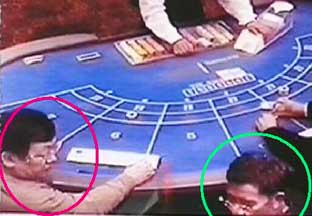
(China Times via Yahoo!
News) Secondly, on the evening when the photograph was shown
and discussed, TVBS had a 1.64 rating between 9pm-10pm and 2.40 rating
between 10pm-11pm. In so doing, TVBS was the most viewed
channel. (China Times via Yahoo!
News) On Thursday evening, TVBS also presented the documents
that was sent to the President's Office about the Thai laborers' contract
and thereby garnered a 3.43% rating, the highest in its 12 year history.
Thirdly, (FTV via Yahoo!
News) a DPP legislator raised questions about TVBS, which she
alleges to be 100%-Chinese owned. Furthermore, TVBS's chairman Norman
Leung had
once served as the director of the Government Information Service in Hong Kong and therefore channel is now
trying to subvert Taiwan from the inside in conjunction with China from the
outside. (China Times via Yahoo!
News) TVBS struck back to say that their financial position
has been thoroughly investigated: TVBS is 47%-owned by the
Bermuda-registered TVBS whose principal shareholder is Sir Run Run Shaw,
with the remaining 53% owned by a Taiwan-based investment
company. Li Tao said: "Over the past 12 years, Sir Run Run Shaw
had not said a word to the more than 1,000 employees of TVBS about what they
should or should not say. If one photograph can topple a government,
then the government of Taiwan is far too fragile ... you can shut down TVBS,
but the people and history will pass judgment."
- [069] Mainstream
Media Panic (Reuters)
WPP chief executive Martin Sorrell warned on Thursday that leading media companies like News Corp. are on the verge of panic amid seismic shifts brought on by the internet.
He singled out the recent internet acquisition spree by Rupert Murdoch's media conglomerate as one sign that media conglomerates are scrambling to catch up, saying News Corp. has been making internet acquisitions "almost willy-nilly."
Sorrell, head of the world's second-largest advertising and marketing company and one of the media sector's best known prognosticators, told attendees at a Internet Advertising Bureau conference that declining circulation, viewership and revenue figures had big media companies running scared.
"I think there's a certain amount of panic among media owners," he said. "Most of these companies, ours included I suppose, are run by 50- or 60-year-olds who have trouble getting it, and who really don't want to see change on their watch."
Maybe they are panicking, but not enough to make ESWN an offer that he
couldn't refuse. Meanwhile when I was in Prague, the Blackberries were
abuzz with the latest about Sir Martin's messy divorce. The settlement
amount of £30 million has been agreed upon. More importantly, if Sir
Martin wants to sleep in his house, he'll have to stay in the basement.
- [068] Wang
Yi's Thank You Speech The following remarks were made by
renowned Chinese independent writer Wang Yi.
(New
Century Net) [in translation] At the Best of Blogs Competition sponsored by
Deutsche Welle, more than 100 bloggers and webcasters have been nominated in
13 different categories. My blog "Wang Yi's microphone" was
nominated in the "Best Blogger" and "Reporters Without
Borders Special Award" categories, being the only Chinese-language
nominee in those categories. Since moving there from "Wang Yi's
home" at Bokee.com, I have published my own essays on this blog and the
blog was also a communication channel for sensitive subjects such as the Shi
Tao case and the Taishi Village rights case. When I learned that a
friend recommended my blog for the DW BOB competition, I joked that this
guarantees that my blog will be closed down. Indeed, even before the
list of nominees was published, the Hainan Internet Monitoring Office
ordered the blog "Wang Yi's microphone" to be shut down.
However, DW went ahead to nominate that blog in those two categories.
It will be an extreme irony and criticism of the Chinese Internet situation
if a non-existent blog shoud win some kind of prize. You can go and
vote at :
http://www.thebobs.de/thebobs05/bob.php?site=home
and
http://www.thebobs.de/thebobs05/bob.php?site=nominate_kat&katid=18&tsrid=583
This is not about me winning a prize; this is about a slap in their
face. Thank you.
- [066] Intolerance
and Hatred So I showed up at my New York City company
office. After taking care of business, I got on the Internet and
marched through my blogroll. I came to New Century Net and I got
blocked by the corporate firewall. I came to ObserveChina (a
'pro-democracy' website funded by the United States of America's National
Endowment for Democracy as well as Taiwan intelligence service) and I got
blocked by the corporate firewall again. I got this explanation:
"This website is blocked because of Intolerance
and Hatred. If you need to access this website, please
contact your system adminstrator." This firewall is just a
commercial product licensed from a supplier, who somehow feels that
way. Intolerance and hatred ...
- [065] The
Chinese Traitor Tea House (6Park)
In Weizhou City, Henan province, a teahouse opened with the name
"Chinese Traitor Teahouse (汉奸茶庄)."
What is the owner's excuse? On October 17, the reporter went
there. The boss was out, but his wife explained: "My husband is
small and short, and he parts his hair in the middle. Therefore, all
the villagers called him by the nickname 'Chinese traitor' ever since when
he was young. That is why he called this place the Chinese Traitor's
Teahouse. If the people call him by that name, then surely he can name
this place by that nickename to indicate that this is his shop."
Yes, the couple is well aware that "Chinese traitor" refers to
pro-Japan collaborationalists. Still, business has been good for the
first few months until the reporters started to show up. The shopowner
is mad because other people should not be poking their noses into how he
wants to name his business.

However, local residents are irate. One student said that
"Chinese traitors" are the quislings that everybody should condemn
and attack. Another citizen said that he will never ever forget the
harm that the Chinese traitors wrought and that he will never ever patronise
a shop with that name. On October 17, "concerned government
workers" told the owner to change the name. On that same morning,
the owner obliged and made a name change to something quite forgettable
(yes, I can give you the translated name but you will forget it immediately
anyway).
- [064] ESWN
vs. CD: A Text Comparison Musing
Under The Tenement Palm has provided a detailed comparison
of the ESWN translation of the Panyu government statement on Taishi village
with the China Daily version. The conclusion: "I think we can
safely say that ESWN was in fact plagiarized. If a student handed this in,
I’d bust ‘em." Now I am a little disappointed because the
China Daily people had actually read the ESWN translation carefully.
This revelation has given pause to my next big project, which is to do a
massive translation with a major bomb built inside to blow up whosoever
dared to cut-and-paste blindly.
What can I do? Nothing. You can read more case studies at
Danwei's section on China
Intellectual Property and Law for items such as China
Daily pirates a blog, and also says "Strong progress in IPR protection
campaign."
- [063] Public
Opinion on Political Reform in Hong Kong The item underneath (#061)
argues for not betting the house on the turnout for the December 4
demonstration, but to look for public opinion polls instead. The first
public opinion poll was taken before the public unveiling of the political
reform.
(SCMP) Polytechnic University
researchers were commissioned to conduct a telephone poll of 1,225 people
three weeks ago. The question they were asked foreshadowed the proposals
released yesterday: "If the government's package of proposals is (1) to
increase the number of Election Committee members from 800 to 1,600 and to
include all elected and appointed district council members; and (2) to
increase the number of seats in the Legislative Council from 60 to 70, with
five of the new seats to be returned by direct election and the other five
by new functional constituency seats to be returned through election by all
district council members from among themselves, would you accept this
proposal?"
Just over 55 per cent of the 1,225 respondents said yes, 22.4 per cent no,
while the rest did not know, had no opinion or were undecided.
(The
Standard) The Constitutional Development Task Force
commissioned Hong Kong Polytechnic University company Technology and
Consultancy to conduct the poll September 27-30. It found that 55.1
percent of the 1,200 respondents would accept the government's package of
proposals while 22 percent disagreed. Forty-five percent agreed that
Legislative Council seats should be increased while 36.5 percent disagreed.
Nearly 80 percent of those who agreed think the number should be increased
to 70, while others would like to see as many as 120 seats. Fewer than
half agreed that the district councils should be given more than their
current one functional constituency seat in Legislative Council, but only
33.4 percent disagreed. On the premise that universal suffrage will
not be introduced in 2007 or 2008, about 75 percent of respondents agreed
there should be some progress in the methods of selecting the chief
executive and for forming Legco, rather than having no change at all.
Okay, this is a game of fractions here.
Why, oh why, would the SCMP reports 55% versus 22.4% to round down the pros
and keep the decimal fraction for the cons whereas The Standard reports 55.1%
versus 22% to keep the decimal point for the pros and round down the
cons!? Could there be any clearer indication of political positions
here? I report, you decide. For the record, Ming Pao (via Yahoo!
News) simply chopped of all the decimal points: 55% versus 22%.
Yes, it looks like a hit with 55.1 percent
for and 22.4 percent against. But 22.4 percent out of 3.2 million voters
equals means 720,000 and certainly much more impressive than a march with
35,000 people. In any case, this is not a slam dunk by a long
shot. The first poll was done before the details of the plan were
disclosed. There will be plenty of time to analyze the proposal and
offer alternatives. So public opinion may shift quickly.
- [062] My
Heart Bleeds for Yannan If you go through my blogroll, you
will see that the Yannan forum is still listed. We all know that it is
gone (see link). Deep in my heart, I know
that it is gone. Yet, I'll not remove it from my blogroll. Every
day, I click on it and I hope against hope that it has come back ... I am stupid,
but you already know that ...
- [061] The
Magical
Threshold for Political Reform in Hong Kong The new government
executive council in Hong Kong has one new member Anthony Cheung with
democratic credentials. The big issue is the political reform package
and the pan-democrats are planning a demonstration on December 4,
2005. In Ming Pao (via Yahoo!
News), Anthony Cheung sets the magical threshold for that
demonstration to have an impact.
This year, the number of 7/1 marchers fell
drastically to 20,000 from the 500,000 of yesteryear. But Anthony
Cheung believes that if the democrats can have 30,000 to 40,000 participants
in the 12.4 demonstration, more than this year's 20,000, then
it will be a 'shocking' number. At that time, Donald Tsang must
reassess whether he has to come up with a different proposal. Cheung believes that the democrats must monitor public opinion. If the public
reacted strongly against the government wanting to preserve the appointed
district councilors, then the democrats must stay together with their 25
votes and negotiate based upon the public opinion. "In 2003,
500,000 people got on the streets and Beijing immediately adjusted its Hong
Kong policies. If the citizens react strongly against the new
proposal, the powers that be cannot completely ignore them."
Is Anthony Cheung a saboteur inside the
democratic camp? Here are the pure quantitative analyses:
There are 3.2 million voters in Hong
Kong. According to Cheung, the government must reconsider its
political reform package if the number of demonstrators reaches 30,000 to
40,000, or just over 1% of the voters. I sure hope that Hong Kong
government and society are not beholden to the demands of any group that
reaches 1%. You can start thinking of all sorts of new proposals that
"cannot be completely ignored" ... (hint: try the Truth and Light
Society first). This cannot be about the absolute size of the
demonstration.
In terms of relative size, 30,000 to 40,000
is enough to have an 'impact' because that number is significantly higher
than the 21,000 claimed at the 2005 7/1 march (July
1 Afternoon March Estimates). This will therefore be an indication
of a trend reversal. But what is the composition of that 21,000?
According to July 1 Afternoon March Photos,
there were large groups which will not turn out for the 12.4.2005 political reform
demonstration, such as overseas domestic helpers. If you subtract
those groups from the 21,000, the 30,000-40,000 figure may be tough to meet
unless public opinions have shifted dramatically since July.
Finally, if this magical threshold is
accepted as conventional wisdom, then the whole thing is dead if there are
fewer than 30,000 on that day. There will probably be multiple professional teams
out there to count, so overclaiming won't work.
Here is my suggestion -- stick to public
opinion polls and don't bet on one and only one demonstration march. The
public opinion polls consistently say 60%; the march may not exceed 1%.
Where would you put your bet on?
- [060] China
Daily Plagiarizes ESWN Recall that I translated the Q&A
session with the Panyu District government concerning The
Taishi Village Elections (Chronology) (note: go to the date October 15, 2005). Guess what? China Daily published
Guardian admits Taishi reporting false
and Truth
of the Taishi village incident on October 18, 2005. I ask, is
it possible that two translators cames up with the same translation?
Here is an example: In the answer to Q7, I wrote: "After the village election committee announced that recall was not longer in effect
..." and China Daily wrote: "After the village election committee announced that recall was not longer in effect
..." What is the likelihood of an English grammatical mistake
occurring by sheer coincidence? By the way, what are the odds that
China Daily will plagiarize the item immediately below this one?
- [059] Reading
the Text, Again Why should I be interested in translating the
Q&A with the Panyu District government concerning The
Taishi Village Elections (Chronology) (note: go to the date October 15,
2005. Isn't it just propaganda? Well, even propaganda have to
be constructed with the known realities and it is possible to read the text
closely and discern what is absent. Here is an example:
Around 8:40pm on September 8, Lu
Banglie brought two foreigners into Taishi village in a rented car. They
were stopped near the Taishi Secondary School by some villagers of
Taishi. The villagers warned Lu Banglie not to stir up trouble in the
village because they won't listen to them anymore. They told the group
to leave immediately, but the Lu trio attempted to force their way in and
there was some pushing and shoving. At 8:50pm, the Yuwotou police
received a report and proceeded to the scene.
For safety reasons, the three individuals
were taken back to the town government building. ...
Since Lu Banglie claimed to be injured, the
Yuwotou police station sent police officers to take Lu to the town hospital
for a full physical examination including CT and other procedures. The
doctors believed that Lu was normal except for some light scratches on his
hands. As Lu was a representative of the people's congress, the relevant
persons called the standing committee of the Zhijiang City people's
congress. At 10:41pm, the Zhijiang City people's congress standing
committee replied and asked the Panyu District people's congress to bring Lu
Banglie back to Zhijiang City. The Panyu District people's congress then
arranged for workers to take Lu back to Zhijiang.
At 730pm on September 9, Lu Banglie arrived
at Zhijiang City in Hubei province. The Zhijiang City people's congress
standing committee immediately arranged for Lu Banglie to be examined at the
Bailizhou town hospital. On the morning of October 10, they brought Lu
Banglie to the Zhijiang City People's Hospital for further examination while
asking the legal medical expert of the Zhijiang City Public Security Bureau to
be in attendance. After repeated examination, except for the legal
medical expert identifying the light scratches on his arm (believed to have
been caused during the pushing and shoving with the villagers when Lu insisted
on entering), Lu was deemed to be normal otherwise. Afterwards, Lu
Banglie signed his name on the town and city hospital examination
results. Therefore, the "bloody incident" in which Lu Banglie
was beaten or killed was fabricated.
What is absent here? The
Panyu government puts a premium on the fact that Lu Banglie signed his name on
the town and city hospital examination results in Hubei. That was the
clincher for them. Okay, let us grant them that. Now comes the
obvious question: "Sir, could you tell me if Lu Banglie signed his name
on the Yuwotou town hospital examination (which was a full examination
including CT and other procedure) which took place between 8:50pm and 10:41pm
on the evening of the incident according to your timeline? If not, why
not? Could he have been in a coma at the time?" If there
was a signature from Lu Banglie then, the Panyu District government would not
even need to refer to the Hubei examinations -- the man signed the form at the
Yuwotou town hospital and therefore his claim of being unconscious must be false!
Therefore, we can assume that there was no Lu signature, and you can guess
why.
By the way, according to a brief
note in Boxun,
Lu Banglie has decided to sue the Panyu District government for claiming that
he passed out for more than 10 hours after just some "pushing and
shoving."
- [058] China
en Español From Shanghai
Express: "Gracias ... a ESWN por incluir en su sección de “recommended reading” el post que Shanghai Express dedicó a los blogs sobre China en español. Sólo por esto último, por ver uno de sus posts enlazado en uno de los principales blogs de Asia, escribir Shanghai Express ya habría valido la pena."
ESWN v1.0 actually contained more material on Latin America than
China. I wish that there was some more that I can do to facilitate
communication between China and Latin America, when there are clearly
national strategic interests present. The difficulty is that not many
Chinese- or English-language readers read Spanish.
- [057] Vultures
So I said something mean in Media
Coverage of the Taishi Village Affair: "Trust me when I say
that I know who my allies are and who the vultures looking for a dead body
are." I won't try to name my allies in case I offend someone
through omission. I can tell you who the vultures are: Starting
off with the traffic driver Instapundit:
"Gateway Pundit has more on the surprising
progress of the Chinese democracy movement. I guess that's what's
got the authorities scared enough to commit murder." The title of
the linked post was "Murder & The Chinese Democracy Movement."
I have to point out that Gateway Pundit was good enough to provide an update
at the end: " (Tuesday PM) Lu Banglie has been found alive. After he was beaten unconscious, he was brought to his home province. He is badly hurt."
That's it.
But I was most astonished by the lone comment that I saw over there from
T.M. Lutas: "There is a way out. Legalize the ROC political parties in the PRC, adopt the ROC election laws, and reunify the country on the basis of a multiparty, democratic China. The US helps by holding the hand of the nervous nellies in Taipei, a huge chunk of ticked off citizenry goes into these new parties instead of looking for party cadre to hang, and China can peacefully rise as it slips from all the restrictions and sanctions that one party political dictatorships face.
You read it here first." Yes, you read it here first -- none of
these problems would occur if only China has Parliamentary
Debate, Taiwan Style. I'm sorry -- the whole thing is a dishonor
to the citizens of Taishi Village. [Alternately, I just fell for a
troll.]
- [056] Warm-up
Demonstration for WTO-MC6 The following are four newspaper
reports of what happened after a roundtable forum in Hong Kong with WTO
Secretary Pascal Lamy. Which is your regular newspaper? What did
you learn?
(SCMP)
After protesting before and during the meeting activists blocked Mr Lamy's car when he tried to leave.
... After he realised his car was blocked in, Mr Lamy got out of the vehicle to receive the petitions from the activists.
(The
Standard) But protesters - as angry at [John] Tsang as they are at the WTO - chanted "Shame to Tsang" as the pair headed for their waiting vehicles.
Tsang quickly left in a separate car, but Lamy was stalled for about 10 minutes outside the theater by peaceful and mostly good-natured demonstrators who swarmed around his vehicle holding bright posters calling for an end to the WTO.
Lamy reacted by getting out of the car and meeting the demonstrators. He said he would receive their petition. It actually took a few seconds before the lead demonstrator could come forward with his petition.
Lamy smiled and shook hands all round, accepting letters and protest notes.
Just before he got back into his car, he paused and asked if anyone else wanted to hand him a petition or protest. Then he smiled again and waved as university security guards helped part the crowd so he could drive off.
Tsang, who was the real target of the demonstrators, missed Lamy's smooth performance.
(Oriental
Daily, Ming
Pao) When the conference ended, Tsang and Lamy were supposed
to speak to the media, but they decided not to leave from the rear exit
instead, and their cars headed in different directions. The more than
100 representatives immediately gave chase, and used banners and a human
wall to intercept Lamy's car. The demonstrators surrounded the car and
a HKCTU representative Fung Tat-wah even got on the engine hood even being
pulled off. It was chaos for a while. After five minutes, Lamy
calmly got out and accepted the letter of petition before leaving.
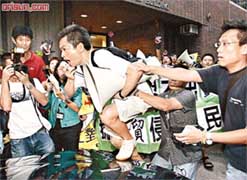
(Sing Tao via Yahoo!
News) 昨日行動引起的話題,不是世貿運作的缺失,而是示威者包圍拉米的座駕和踏上車頂,而單是這行動本身,已經難獲大部分市民認同。兩年前大批市民為反對立法落實《基本法》第廿三條而包圍當時保安局局長葉劉淑儀的座駕,群情洶湧,也沒有衝上車頂。過分激烈的行動,並不符合香港的示威文化。
(translation: The action yestrday led to these comments not so much
about WTO but about the fact the demosntrators surrounded Lamy's car and
jumped on the top of the car. This action alone would be hard-pressed
to receive the suport of most citizens. Two years ago, many citizens
opposed the Article 23 proposal for the Basic Law and they encircled the
vehicle of Secretary of Security Regina Ip, but no one jumped on the
car. Extreme actions do not fit the culture of demonstration in Hong
Kong.)
- [055] The
Guardian Responds The Guardian's readers' editor Ian Mayes has
written Seeing and believing in China
on the matter of Benjamin Joffe-Walt at Taishi Village. This
controversy was covered in my previous post The
Case of Benjamin Joffe-Walt. In my later post Media
Coverage of the Taishi Village Affair, I listed three things that the
Guardian should acknowledge. I characterized the threshold as being set very
low. Let us see what has been done with respect to them.
(1) Benjamin Joffe-Walt's description was inconsistent with the true
extent of Lu Banglie's injuries. The Guardian acknowledges this, first
in the Corrections And Clarifications of October 13 and now in Ian Mayes'
report.
(2) Still, this was understandable given the
barbaric circumstances that the young and inexperienced reporter found himself to be
in. Ian Mayes' report gives a detailed explanation about Benjamin
Joffe-Walt's state of mind before and after the incident. One cannot
help but be sympathetic with him after reading: Joffe-Walt having expressed repeated apologies for what he had done and its implications for the Guardian, and indeed for the pro-democracy movement in China, said: "This was a situation in which I honestly, for the first time in my life, thought I would die."
(3) And the Guardian promises that it will have rigorous procedures in place to make
sure that this will never recur. I do not think that this is really
necessary. There clearly are procedures in place under normal
circumstances. But this was not a normal situation and the system failed
("He filed only an hour before deadline, which left little time for interaction with the desk. He was not specifically questioned by the desk in London about some of the details in his description. He was not asked how far he was from Mr Lu when the latter was being beaten. He was not asked how clearly he could see the things he was reporting he had seen. At the same time Joffe-Walt failed to communicate to the desk the condition he was in then and was still in at the time of writing. He was still convinced at that time that Mr Lu was dead.").
The next time, the desk will undoubtely be on the alert.
By the way, Chinese blogger Anti translated Ian
Mayes' essay into Chinese on his blog with the title: The
Honest Character of the Guardian. In the comment section, Anti
added that he admired the fact that the Guardian had an independent readers'
editor and wished that China would consider the same.
Now that wasn't very hard for the Guardian to
publish that statement, was it? As I said, the threshold was being set
very low. It was about stating the obvious. There were plenty of
surrogates out there saying the same thing, but the Guardian must say so
itself. My personal regret was that the Guardian waited until October 17 for
Ian Mayes' regular date instead of much earlier to put out the firestorm.
And by the way, I have not mentioned this, but Anti took my post Media
Coverage of the Taishi Village Affair and posted it in English on his
website under the Chinese title of 东南西北博客关于本杰明事件的评述.
Please think about the asymmetry here. Anti felt nothing about posting an
English-language post onto his blog because he expectd his readers can cope; if
I had posted the preceding Anti blog posts in Chinese on the ESWN blog, most of my readers cannot read
it. There is an asymmetry of information and linguistic ability
here.
Why did Anti put my post there? Because it was important to
communicate to the Chinese readers that someone outside mainland China gets it.
This is how the Chinese- and English-language blogospheres communicate with each
other -- not frequent enough, but effective enough if necessary.
- [054] A
Personal Ad (Boxun)
In Changchun, a man is looking for his wife. By his own account, he is
from Yuxue City. There is some piece of long history about family
problems (the mother-in-law does not like the wife playing mahjong; he
drinks and sometimes beats his wife; etc). So his wife left him and
called to say that she is working in Changchun. This has been over a
month ago. Now the man has come to Changchun and tried to look for his
wife with this sign.

So what? Except this is what the sign says: "Looking for my wife
Ma Yanchun: If you don't come back within three days, I'll kill
you!" He has also called his wife's family and told them that
they better prepare a few coffins if she does not show up in three days.
- [053] My
Heroes/Heroines While some part of the China-themed
English-language blogosphere was busily condemning people as being shills or
dupes who are being maniuplated by the Chinese Communist Party, the folks at
InMediaHK did what was within their capacity. This link leads to a
photo-illustrated report
(in Chinese) of a congregation in front of the China Liaison Office in Hong
Kong, when a number of people explained to the gathered media (which were
not too many) what was happening in Taishi village (Panyu district,
Guangzhou City, China). At the end of the speeches, they presented a
signed letter from more than 200 people calling for the central government
leaders to pay attention to what is happening in Taishi village. If
studied carefully, the weight carried by these 200 plus people is much more
than 200 physical bodies, since they included major figures such as a member
of the Hong Kong SAR government's executive council as well as other
figures. Maybe this won't change anything under the "One Country
Two Systems" arrangement, but at least they did not sit there attacking
others for not doing the 'right' thing.
- [052] Raising
Your Google Link Counts I typed in 'EastSouthWestNorth' and I
got 180,000 Google listings. Wow. It's awesome, dude!
Should I be impressed? Here is the last item on the list:

Eh, no thanks, I think I'd rather settle for a lot fewer Google links ...
- [051] Working
Life in Shenzhen (Wenxue
City) This is a photo that a pedestrian took of a scene in
front of the a foreign capital business in Shenzhen. Four security
guards and then three females down on their knees in supplication.
There are no further details provided from this photo which was taken from
afar. You will just have to use your own imagination about the
story. There are two more photos in that link.
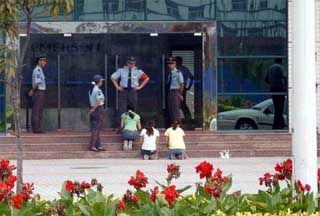
- [050] ESWN's
Media Relations In Rebecca MacKinnon's Taishi Village and The Guardian's big error: Western media discredited in China,
she wrote: "I know for a fact that a lot of Western journalists covering China have already come to depend on ESWN as a source of raw materials, free translations, and story ideas. Too bad most of them can't or don't link back to him and credit him the way bloggers do."
At this time, I am talking to more and more western journalists.
However, the subject of those communications are privileged. I will
not speak to someone over the phone, hang up, reach for the keyboard and
type: "I just spoke to XXX at YYY. He is working a story on CCC
and his angle is EEE. So I told him that MMM and then I said
NNN." That would be a betrayal of confidence to the
extreme. Ergo, I say nothing. That is perhaps unfortunate, because the
subject is not always something obvious (such as Taishi village), but it can be
truly esoteric because the reporter must have been desperate to find someone or
anyone to comment. By the way, I am also quite honest and blunt.
When a reporter calls to find out what it is like to write a blog in a
censored environment, I will tell him/her: "I live in Hong Kong, where
there are no censorship issues. You need to be speaking to someone
inside China." I am not here to help reporters complete a story;
I am here to help them write an accurate story. And they
appreciate that.
When an article is published, I will usually link back to
it. The most recent example is Interfax's Cloak and daggers in cyberspace - dark tales from China's Internet.
By the way, I do not usually criticize a reporter's work (see explanation in
this previous post Media Accuracy).
- [049] Chip
Tsao Gets A Chuckle (SCMP) The article "Have Hong Kong girls stopped looking for Mr White?" in last week's Sunday Morning Post, which cited Tsao's column, has inspired a flood of passionate responses from readers.
Tsao had commented that western men who stayed in Hong Kong after the handover lived in dorms on Lamma Island or stone houses in Sai Kung that people used to "keep pigs
in". He also said expatriate men "clad in T-shirts, thongs and flip-flops" bought beer from the 7-Eleven to get free gifts and were "muscular but did not last long" in bed.
Tsao hit back at the criticisms by saying: "I am deeply disappointed that western readers, especially those from the United States and the United Kingdom, could not read between the lines and find the sarcasm in my statements. I have always been provocative."
He said he was simply writing something "juicy" to reflect a common theme that already existed in the Chinese-language media.
"If these people saw what Apple Daily and the rest of the Chinese-language papers write, they would not have been so shocked by my column. Hong Kong papers nowadays are always talking about how these foreigners are old and penniless. I find their comments racist.
"
Which westerners made it into Apple Daily in recent months? Nancy
Kissel, Roderick Graham Murray,
Miles Henry Jackson-Lipkin, ... So Chip Tsao
was wrong because these three are not "old and penniless" as he
claimed. One is old and another is penniless. But none of them
are 'old and penniless.'
SCMP reader Karl John wrote: "I cannot find one statement of truth, just racist dogma and general sweeping statements.
It is nothing more than a racially motivated observation that has probably been brought about by Chip Tsao's inability to attract interest from Hong Kong ladies."
This last assertion was also incorrect, because the reader must not have read
the tabloid magazines tailing Chip Tsao into hourly-rate motels with Hong
Kong ladies.
Addendum: (Apple
Daily) A 23-year-old foreigner was at a bar on d'Aguilar
Street. His friend accidentally spilled liquor onto another customer
and there was an quarrel afterwards. When the foreigner and his friend
left the bar at 1am, they were attacked by the other customer. The
foreigner got hit in the head with a glass bottle and then the assailant
fled. The police came and took the foreigner to the hospital.
The foreigner is unnamed, but the friend's family name is given as Chung.

- [048] Judith
Miller and the Quest for WMDs
May
2004: "You know what," she offered angrily. "I was proved f***ing right. That's what happened. People who disagreed with me were saying, 'There she goes again.' But I was proved f***ing right."
October
2005: "W.M.D. - I got it totally wrong," she said. "The analysts, the experts and the journalists who covered them - we were all wrong. If your sources are wrong, you are wrong. I did the best job that I could."
- [047] Chinese
Private Investigators for Profit (TVBS via Yahoo!
News) A major problem in Taiwan is the fact that their
businesses see mainland China as a much more profitable prospect for investment. There is little or nothing that the Taiwan government can
do about small companies wanting to invest in China. However, the
government can do something about companies that are listed on the Taiwan
stock market in terms of investment as well as repatriation of
profits. But how would they know what is happening with those
companies on mainland China?
According to Vice-Minister of Economic Affairs Shi Yen-hsiang, the Taiwan
government intends to investigate the situations in mainland China
of companies listed on the Taiwan stock market. It is recognized that
the government has no capability of investigation on mainland China, so they
will outsource the process to private investigative agencies at no more than
NT$500,000 per corporation.
This led to a series of derisory comments.
- What can you get for NT$500,000 per case? (你50萬一個案子都能查的到?).
- At NT$500,000, you won't even find out if the owner has a mistress (包二奶).
- This concerns the interests of the Taiwan business people and it is
frightening. If the Department of Economic Affairs offers NT$500,000,
then the Taiwan business will offer NT$800,000 to get a clean record (事關所有台商權益,聽起來蠻恐怖的,經濟部如果給50萬,台商給80萬,清白來得更容易。).
- Let me tell you, you won't find anything! If the factory
owners won't provide the information, you will learn nothing. This is
laughable! If the government pays for this, it is laughable! (我告訴你,一定查不到!如果廠商不願你給資料,你什麼都拿不到,好笑吧!委託者如果是政府,那不是更笑掉人大牙。)
- It is likely that a company will break up its investment in a number of
smaller of untraceable smaller projects with shell companies.
- In order to find out how about the financial transactions between
enterprises, you will have to resort to 'grey' investigative methods, even
illegal channels (要查出企業縝密的資金往來,恐怕要逼徵信業走灰色,甚至是非法管道).
In that last comment, it should be clear that the investigative agencies
bear all the risks for breaking the law (for burglary,
theft, bribery, etc).
This is all very superficial. The real problem is this: Why do these businesses
think that it is more profitable to invest in China, hide their investments
and conceal their profits from the Taiwan government? The moment that
the Taiwan government can solve this puzzle and reverse the conditions, those businesses would be channeling their money
back into Taiwan in a flash.
- [046] The Chronicle
of the Difficult Official Recall at Taishi Village
There is a long article (in Chinese) in ChineseNewsNet
(also New
Century Net) by the renowned rights advocate Yu Meisun (俞梅蓀).
This is much more detailed and coherent than my English-language account in The
Taishi Village Elections - Part 1 (Chronology). My work was
compiled over time, with bits and pieces added as things developed; as such,
it lacks smoothness and it contains some known errors that were allowed to stand
(e.g. the villagers' SMS reports on the attack on Lu Banglie and Benjamin
Joffe-Walt).
Yu's essay is very long, and I do not have the time for a full translation
as I am due to make a long trip. It would have been a worthwhile
project. So I will walk through the essay and write down the points
that have not shown up in the English before. In broad strokes, it is
consistent with what I had sketched but Yu had the time and patience to fill
in a great number of details.
After the recall committee was democratically elected, the local government
officials used the following tactics to thwart the campaign:
- Of the seven elected committee members, six resigned for reasons of
health, lack of education and lack of time due to the need to work
outside. They were replaced by people on the official list of
candidates. According to top vote-getter Wu Jianxiong: "Before I
resigned, they told me the seven of us are on a blacklist. I knew that
if I resigned, I am helping them. But for the safety of my family, I
resigned. Afterwards, they told me that I don't have to worry about getting
arrested anymore." On 9/23, the final holdout from the original seven
Feng Jianming also succumbed to pressure and resigned.
- On the evenings of 9/20 and 9/21, the village committee feted more than
140 villagers at a local restaurant; on 9/22, they feasted the production
brigade shareholders and leaders at the Xichao Yugong restaurant. One
attendee said that a government official told him that the leaders of any
disturbance could get three or four years of jail time. Meanwhile, all
the villagers
could also go to the Haitian Teahouse next to the village office to get free
meals. Some villagers ate there, because they might as well as get
something out of it; other villagers refused to go because the whole concept
was repulsive.
- The government sent Taishi village cadres to visit every home to get a
renunciation of the recall signature. According to someone who signed
the renunciation, the district government promised to release one detained
village for every 21 renunciations. There are 27 detainees at this
time, so they could come out if there were 21x27 = 567 signatures. On
9/29, 396 out of the original 584 signers had renounced. However, some
people are angry because there are still 15 detainees.
- In the matter of Guo Feixiong. Here is the chronology. On
9/13, Guo 'disppeared' (i.e. was detained). As in past personal
practice, Guo began a hunger strike. On 9/15, he wrote a power of
attorney letter to lawyer Tang Jingling. On 9/25, four released
villagers said that they saw Guo wrapped up in blanket in the heat of day in
jail. On 9/26, lawyers Tang Jingling and Guo Yan finally received the
power of attorney letter. They tried to visit Guo, but were told that
their application will take two days to process. By law, the family
should have been noticed within 24 hours; by law, the defendant should be
allowed to have access to a lawyer after the first interrogation or upon
formal arrest. On 9/28, the lawyers met with Guo, who was weak having
lost a lot of weight. On 10/5, the lawyers were informed that Guo was
formally arrested. He is not eating so he is sustained by injections
from a doctor.
- On 9/19, Panyu Daily published a report that the villagers did not
understand the truth and were persuaded to hold illegal assemblies and
attacked the police on 9/12. The villager named Feng said: "That
incident has been totally reversed. They reported that the villagers
used bricks to attack the police car. The truth was that the police
ran into a tree due to careless driving and broke a car window. Then
they put two bricks on top and took a photo to say that the villagers did
it. What kind of news is that?" A reporter called upon the
editor-in-chief at Panyu Daily about the negative reports on Taishi village,
and he replied that he personally supported the democratic election in
Taishi village but there are some things that are official responsibities
and therefore cannot be talked about.
- Who were the 'thugs'? On 10/12, a villager named Feng told a
reporter: "Among those who assaulted Lu Banglie were village cadres,
including the production brigade leader Chen Canhua. He is a member of
the village committee, so the recall affected his direct interests. He
makes money by beating people up and he has a relative with the public security
bureau. He is the person who poured dirty water on Ai Xiaoming and the
two lawyers. Anyway, there are people keeping watch in the village day
and night. Some of them are village cadres and there are some from
outside that I don't know." [Note: Lawyer Guo Yan told Radio Free
Asia: At 11:38pm on October 8, Guo received a message from a villager
that had the names of the individuals who assaulted Lu and the
foreign reporter.]
- On 9/21, the pages of the six websites (燕南社區
(Yannan Community),凱迪,關天茶舍,世紀沙龍,中國選舉與治理,公民權利)
that had the most heated discussions about Taishi village were banned.
Yu Meisun had been spending his time on those websites day and night since
August.
On 9/23, Yannan forum webmaster/legal scholar Fan Yafeng wrote:
"Recently, there have been a succession of ban orders. The Taishi
village case is banned, the Wang Binyu case is banned, and then we cannot
even talk about Li Ao's speeches. These deliberate, anonymous and
irregular procedures have become normal. Can the relevant departments
tell the public the legal basis of their actions? the policy basis? This is
not the way to produce citizens for a harmonious society! Will the
officials at the news office please respect themselves!"
On the afternoon of 9/29, the Yannan forum at the Beijing University was
closed. There was a notice from the Beijing City Communications
Control Bureau: "The Beijing City News Office has closed down Yannan
for repeated violations of regulations." Yannan is a massive
forum. The law discussion section is about 1/100-th of which the
Taishi village discussions were about 1/100-th. But Yannan forum is no
more.
- On 10/5, the website Gender Education Forum at Zhongshan University in
Guangzhou was shut down by the Guangzhou public security bureau. The
website was run by Ai Xiaoming, who was named as one of the three black
hands at Taishi village along with Guo Feixiong and Lu Banglie. The
website is for students and has little or nothing about Taishi
village. After Ai Xiaoming was assaulted in Taishi village on 9/26,
the Zhongshan University security office has instructed all BBS forums
inside the university not to discuss the Ai Xiaoming case.
- On 10/10, the website Viewpoint
(觀點) was
informed by telephone from the Guangdong province News Office to clean out
all mentions of Taishi village by 10/12 or face shutdown.
- On 10/14, Yu Meisun searched for keyword Taishi village in Chinese and
found 216,000 pages on Google, 58,500 pages in Baidu and 11,665 pages in
Sogou.
- [045] Anti-Japanese
Fever Aroused By Shenzhou VI Huh, how did that work?
Heaven forbid, but the digital camera in the Chinese astronaut's hand could
be made in Japan! For example, at this forum,
the determination was made from a group effort as people discussed the
various Japanese brands and models. So when the astronauts land, that may
be the first question at the press conference. If they are smart, they
will have the technical defense -- yes, it is a camera with a Japanese brand
name, but it was made in China!

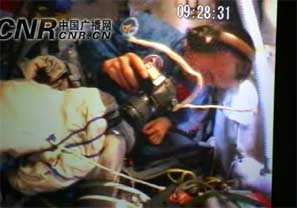
What is the fuss anyway? American astronauts do spacewalk with a Nikon in
hand. This is a globalized world, isn't it?
- [044] "Trust
No One ... Not Even Yourself" All those people who have
worked with me at various points in time will chuckle at that oft-repeated
admonition from me. In a comment by 'David' at the New
Media Workshop, Journalism and Media Studies Centre, University of
Hong Kong:
…ESWN (zonaeuropa) is a very interesting blog for me because he often offers immediate translations of mainland and local stories, often pointing out flaws and offering interesting links…but i still would not rely on these as sources as i am unable to verify the translations…often i take a point from here and search around until i can verify his info…
Yes, he has really got it. For me, the
true lesson of the Media
Coverage of the Taishi Village Affair is this (and some of Chinese
blogger Anti's commenters got it as well) -- nobody should get a free pass to
be speaking the 'truth' on account of their credentials. Just because
you are the New York Times, Washington Post or any foreign media does not
guarantee that you are writing the 'truth' this time. An Anti reader
quoted this comment of mine from Super
Girl and Democracy:
It is about
building a social environment in which people learn to be critical and look
underneath the veneer. You can start by listening to what any public
figure (whether this is a national leader, scholar, writer, dissident, or blogger) say
or write, and check against the facts.
And then you won't get fooled again ...
This leads to the matter of brand
trust. If I've often lied to you the last 100 times that you checked, do
you think that you would want to read what I write? Conversely, if you
like what I read and you think that I'm okay the last 100 times that you were
able to check, I think you will keep reading me (but I hope that you will use
your instinct to withhold your belief and wait for verification if the
circumstances are suspicious).
Building brand equity is a long-term project
here. There are two things that I want to establish. First, it is
about brand trust. That can be earned over the long term when most of
what appears here turn out to be accurate. Furthermore, I am willing to
acknowledge an error when that occurs. At this time, ESWN is a blog and
may not be accorded the same degree of trustworthiness as a mainstream media
brand that has a hundred year history. Just give me another few more
years and I will get there. Second, this is about brand
satisfaction. I want to provide information that is not otherwise
available or as comprehensive. Marketers use the question "Would
you miss this blog if it were no longer there?" (see my old post).
Just give me another few more years ...
Will this blog (or in conjunction with other blogs) replace mainstream
media? No way. New York Times Editor Bill
Keller spoke in Phoenix last week at the annual Association of National Advertisers conference:
"Most of what you know, you know because of the mainstream media.
Bloggers recycle and chew on the news. That's not bad. But it's not enough."
That will remain true. When any reader writes in to thank me for telling
them about China, I am pained. I cannot pretend that I am telling anyone
about this thing known as China. It is a much more complex subject and a
website like China Digital Times
provides a more comprehensive view on a daily basis. However, some blogs will be able to fill in
information gaps in a timely and informative manner, and that is where I want
to be. For a major suddenly breaking event, you suspect that the mainstream
media may not be telling you the whole truth and you will click to check ESWN
instead because you will expect me to be more informative and accurate.
That is where I want to be. I intend to win your trust.
- [043] Chinese
Media Shields Super Girl (Wenxue
City) Super Girl champion Li Yuchun was asked to sign a note
of congratulations for the successful launching of Shenzhou VI
spacecraft. It is shown in the photo on the left. Unfortunately,
our Super Girl misspelled Shenzhou (神州六号
instead of 神舟六号).
Not to worry, because the Chinese websites promptly Photoshopped it from 神州六号
down to the abbreviated form 神六,
as shown in the photo on the right. Chinese media hearts Super Girl.


- [042] My
New Neighbor This is yet another story about how far Hong Kong
paparazzis will go to get a non-story. In East Week (issue 111), it is
reported that singer/actress Kelly Chan and her longtime boyfriend Alex have
just moved into a house at 8X Kadoorie Avenue. This 3,000 sq ft house
was rented for HK$160,000 per month. Last week, Kelly Chan was
performing in mainland China. So the mission of the paparazzis was to
follow the boyfriend Alex around to see if he is cheating on her. On
Wednesday (October 5), Alex left work at around 7pm. He went to a
takeout restaurant and bought some barbequed meat. Then he went home
and stayed in.
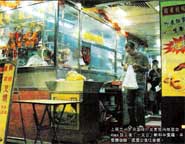
As I said, this was a non-story. East Week costs HK$20. Did my
money go down the drain? Not to fear, because the magazine comes in
two thick volumes.
There is another all-too-real story in which the male reporter went
undercover to see an unlicensed doctor. The reporter began with a
direct question: Will the doctor be willing to write a note to be used to
explain absence from work? Yes, the going rate is HK$90 for one sick
day, complete with registration, diagnosis and medication. Later, the
newspaper sent a male informant to visit the doctor with a hidden
camera. The doctor gave him a cursory examination and then proposed:
"When I touched your nipples, did you any reaction down there? You
don't have to worry about being gay. The fact is that when a guy gets
touched by other guys, it is normal to have a reaction. Male friends
should help each other masturbate. That is very normal." At
this point, the doctor attempted to reach into the patient's pants, causing
him to jump back. The doctor then said, "Oh, don't worry, I'll
help you." Then he took a gay porno magazine out and pointed to a
photograph of two males engaged in oral sex: "See how happy they
are! I can help you masturbate, or even do what you see in the
photograph. There is no need to wear a condom. You can ejaculate
anytime." At this point, the doctor got excited. He pulled
down his own pants, reached down and lifted his eyes to the ceiling:
"The doctor is being very open here. I am having an
erection. You can touch it!" At that point, the patient
fled.

The story then went on about the effort to check the credentials of the
doctor. Following the information on the business card, the reporter
contacted a hospital in Shenzhen. There is no record of such a doctor
there, but once shown the photograph of the 'doctor', the hospital director said: "He
is not a doctor here. He was my patient. I operated on
him!"
P.S. This sort of comment drives my readers crazy! Why am I
telling them this!? They came here for the high-minded stuff. Well, you don't care about it and neither do
I. But the reality is that this is what 99% of Hong Kong journalism is
about. It would be wrong for me to communicate to you that all the media talk about is "Long Hair" Leung Kwok-hung, the
Hong Kong Democratic Party or the Article 45 Concern Group. This is
just my wake-up message to y'all. But whether you are from Hong Kong
or elsewhere, this should give pause to think about what is happening in the
media world. This kind of crap does sell copies. Why!? I
don't want it and neither do you. But why would they sell so many
copies all the same?
- [041] Translation
Error Have you spotted the error yet? If you are American,
you may think that the 'jewellery' should be 'jewelry' but this is the
proper British spelling. The proper translation from Chinese is: "Gift & Fake
Jewellery Center." But we wouldn't want the English-only reader
to know that the jewellery is fake, would we?

(source: Next Magazine (HK), issue 814)
- [040] Chinese
Lie Detector Tests I am fortunate in that I can read both the
Chinese-language and English-language blogospheres. In the matter of
Taishi village, I have translated some interesting Chinese blog/forum posts
into English. Is there anything that is worth the trouble of
translating from English into Chinese? Well, maybe for the purpose of
confirming the worst opinions that the Chinese may have. For example,
how about the technical grammar-parsing of Benjamin Joffe-Walt's account of Lu
Banglie's physical state to become medically consistent with his miraculous
return? It simply does not pass the laugh-test of Chinese citizens; it
comes through as an insult to their intelligence. As another example, there is the lecture to the Chinese
netizens not to be manipulated the Chinese Communist Party.
Apparently, westerners think the Chinese need advice on that score. So
I am going to get translate a couple of paragraphs from another Anti blog
post (远离任何谎言,哪怕它对你很有利——本杰明事件再讨论):
We have always lived in a world of
lies. From the time when we were small, we were filled with various kinds of
lies. When we finally woke up, we swore that we will look at the real world
and we will tell our children about the real world. That is an
important reason why I chose to be a news worker. I feel that too many
reporters are lying. I want to do my own investigation to make sure
that I can tell my readers the truth as I saw it. Our generation is
the geneartion that is the most super-sensitive about distinguishing truth
from lies. We take a sniff and we know whether it is a lie, and
whether it is a big or small lie.
Today, anyone who lies will have to pay a
heavy price. This is why I believe that all government public
relations activities are useless at this time. Since no one believes
you, it is useless no matter how you soften your propaganda. When an
incident breaks out, our first reaction is that the government is
lying. This is based upon our experience. The opposing forces or
the weaker ones now have inherently better trustworthiness than the
government. Foreign news is also like that. Therefore, many of
us will trust the foreign reports about China instead of the official news
from the Xinhua agency.
Given that position, there are some immediate
consequences:
When Benjamin Joffe-Walt reported about
happened to Lu Banglie, our immediate reaction was to believe him because we
believe in the foreign media all along. We even started to prepare to
donate money, voice support, sign petitions and make protests. Then
all of a sudden, we were told that this was just a fantasy of Benjamin
Joffe-Walt. You must realized what a major shift it is for us.
Even though this does not destroy all of the trust of the civilian sector,
it is for certain that the next time that The Guardian or any other foreign
media reports on an exclusive about an incident, we cannot be naturally
trusting.
In order to guarantee this natural trust,
we must criticize any exaggerated or false report, even if it may bring us
good results. We should reject all temptations to exaggerate or lie in
order to accomplish our goals. The only reason that we still have a
small voice inside this propaganda system is that we are speaking the
truth. If we start lying as well, how can we have any voice at all?
- [039] The
Railroad Police Trial (6Park)
A recent court trial received a great deal of attention in China. The
case was about police officers at the Chengdu Train Station accepting
systematic bribes to let robbers and thieves work there freely. By
law, court trials are supposed to be open to the public. However,
there was some internal dissension about how this trial would be
conducted. On one hand, some felt that the courtside reporters might
create an image problem for the railroad. On the other hand, others
felt that banning reporters from court would only lead to more speculations
and roadside rumors. There would be a compromise solution, and it will
be an open hearing - with a twist.
There were 95 seats. 6 were reserved for family members; 5 were
reserved for media that 'couldn't be chased away' (赶不走);
and all the other seats will be given to railroad law enforcement
personnel. On that short list of media were People's Daily, Xinhua and
CCTV, and even Legal Daily did not make the cut.
At 6am, reporters began arriving at the court to get passes. They were
told that there were none.
At 7am, the elderly Mrs. Lau skipped breakfast and showed up at court to get
a spectator's pass. There wasn't any.
By 8am, more and more people were gathered in front of the courthouse.
But they were blocked by a phalanx of armed court police officers, with
police dogs ready to go.
At 910am, the more than 20 media reporters outside went to the court office
and demanded to be admitted. There was some physical contact with the
court police. The mystery was that this court has a state-of-the-art
video system that could have allowed the reporters watch the trial from the
outside. Instead, the reporters were reduced to begging for
information from people exiting the courtroom.
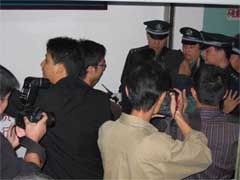
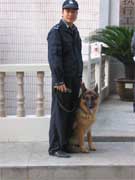
Did this reporter from Chengdu Evening News get a story? Late that
night at 11:03pm, at a secret location in town, an unidentified informant
brought the reporter a copy of the court documents on the charges. All
the details about the case are in there about the who, when, where and how
much.
- [038] A
Girl Jumps To Death (Oriental Daily via Yahoo!
News) In the Wong Tai Sin district of Hong Kong, a 26-year-old
female jumped to her death from the 26th floor. This story will be
around for some time because she left 6 letters and a 10,000-word document
against the police. The tabloid magazines love this stuff.

The female worked as a prostitute for a mama-san named Connie. At 11pm
last Thursday, the girl received instruction from Connie to pretend to be a
Taiwanese girl and serve a client at an hourly-rate hotel in Wanchai.
The agreed upon price was HK$3,000. As usual, she asked the client to
pay HK$500 up front. The client demanded to have oral intercourse, but
he refused pay the remaining sum afterwards. The girl called Connie
for help, and the client was threatened with castration and a glass bottle
bash on the head. The girl then took HK$2,500 from the client's
wallet. When the girl stepped out of the hotel, she was arrested by
the police. The client was in fact an undercover police officer.
A female police officer searched the girl's bag, found the HK$3,000 as
evidence and then threw away the condom with the policeman's sperm in
it. The girl was booked for threatening behavior and theft.
Afterwards, someone told her that she is looking at three years in
jail. The girl got despondent and committed suicide.
(Oriental Daily)
According to police policy, undercover police officers can receive a hand
job, but oral and vaginal intercourse is strictly forbidden. Working
girls will routinely take away the used condoms as protection.
Following the initial DoD turndown, Ellen Preisser and this writer then data-mined unclassified information to report to Mr. Weldon on possible Chinese front companies in the United States seeking technology for the People's Liberation Army.
It showed how Chinese front companies in the United States listed as U.S. corporations were acquiring U.S. weapons technology from U.S. defense contractors, and improving China's military capability. Such access to U.S. technology then would allow the Chinese over time to duplicate U.S. military systems down to the widget.
Indeed, a June 27, 2005 article in The Washington Times reported U.S. investigators were concerned with China and its middlemen increasingly and illegally obtaining "sensitive or classified U.S. weapons technology" from U.S. companies.
Reaction to the study on Chinese front companies in the United States from the Army and the General Counsel's office in the Office of the Defense Secretary was immediate. In November 1999, they ordered the study destroyed, but not before Mr. Weldon complained to then Army Chief of Staff Eric K. Shinseki.
Mr. Weldon also wrote a letter to then-FBI Director Louis Freeh requesting an espionage investigation. Mr. Freeh never responded to the Weldon request.
Laura Rosen links to the
New York Post
on why the study was destroyed.
Sources said the private contractors, using sophisticated computer software that sifts through massive amounts of raw data to establish patterns, came up with a chart of Chinese strategic and business connections in the U.S.
The program wrongly tagged [current Secretary of State Condoleezza] Rice, who at the time was an adviser to then-candidate George W. Bush, and former Defense Secretary William Perry by linking their associations at Stanford, along with their contacts with Chinese leaders, sources said.
The program also spat out scores of names of other former government officials with legitimate ties to China, as well as prominent American businessmen. There was no suggestion that Rice or any of the others had done anything wrong.
So let's see how sophisticated this can be:
(1) Condoleezza Rice is the provost at Stanford University; (2) she has
visited China more than once; (3) Stanford has US defense department
contracts; (4) Stanford has academic exchange with China. Therefore, she
is a tech spy for China and must not be given security clearance. This is
what
the 'sophisticated' computer program said, so it must be true. Case closed.
No appeal possible.
My colleague Rebecca speculates that US papers may be reluctant to write about the matter because they can’t reach the village in question and can’t confirm Banglie’s death.
Oddly enough, neither can the person who’s been doing the best job of covering the story: Roland Soong of
EastSouthNorthWest. A Hong Kong-based media critic, Roland’s been doing exactly what skilled journalists could be doing with the Taishi story - collecting accounts online, via email and from media sources, translating from Chinese to English, and organizing them into coherent narratives, like this
hugely useful
timeline.
While I’m not generally a blog triumphalist - I believe there are stories that mainstream media can cover that bloggers cannot, and that bloggers usually follow, rather than lead the media - this is a case where bloggers and citizen journalists have been running circles around formal journalism.
Jeff Alworth (at Low
on the Hog) suggests that mainstream media have choices too.
While the Times has restricted its most read online content and restricted other internet-only content to its subscribers, the WaPo has gone the other direction. They've given print space to bloggers, covered bloggers in their media coverage, created their own blogs, and most alluring (to bloggers), they now have a little box on each page powered by Technorati that searches the net for blogs linking to the page.
- [035] Nobel
Economics Prize Robert Aumann and Thomas Schelling share this
year's Nobel Prize in Economics. Schelling, eh? How close was
I? I googled the
name Thomas Schelling together with my own name, and there are four references
(disappointingly low!). Here is one of them: Notes
for a history of the critical mass model.
Mark Granovetter (“Threshold models of collective behavior,” American Journal of Sociology 1978) provides another early general treatment of the critical mass model. His treatment is inspired by the literature in sociology on the genesis of riots and revolutions, and so rather than focusing on Nash equilibria considers the characteristics of the steady state which would be reached from an initial condition of zero. This consideration of dynamics yields a feature of the critical mass model which was not emphasized in Schelling’s treatment: the equilibrium correspondence (or the lowest steady state) is nonlinear or discontinuous in group composition, i.e., a slight shift in the group’s level of heterogeneity or in its average preferences may lead to a large shift in overall behavior. Granovetter suggests that the model could be applied to diffusion of innovations, rumors, diseases, strikes, voting, educational attainment, leaving social occasions, migrations, and intervention of bystanders; and provides a detailed analysis of rioting. With coauthor Roland Soong, Granovetter later applied this model to diffusion of technology (“Threshold models of diffusion and collective behavior,” Journal of Mathematical Sociology 1983), consumption (“Threshold models of interpersonal effects in consumer demand,” Journal of Economic Behavior and Organization 1986), and diversity (“Threshold models of diversity: Chinese restaurants, residential segregation, and the spiral of silence,” Sociological Methodology 1988).
Yes, I could have been a star too. But
life is about a series of forked paths and at some point, I took a different
branch and I eventually ended up with the ESWN blog instead of accepting a
Nobel prize in Stockholm ... oh well ...
- [034] Disguising
Taishi How pathetic can this get? As we all know, it is
no longer possible to post any comments about Taishi village at Chinese
forums. So here we are at Xici Hutong forum and we have a
soon-to-be-deleted post titled "广州的那个村的消息"
(translation: "information about that village in
Guangzhou"). No names here, but everybody knows that there is
only one village in Guangzhou on people's minds these days. Then the post goes on to say: "我被打了,被摩托车撞了。那个村农民失败了。
想了解的话,就在此留言。我一一用留言回复。"
(translation: I was assaulted. I had a collision with a motorcycle. The
villagers have lost. If you want to know more, please leave your email
address here. I will reply to you.") Why kind of interactive
BBS forum do we have here? Do people have to resort to oblique
references and subject themselves to probes from undercover state agents?
- [033] Why
Blog? This is about Taishi village. At InMediaHK,
Oiwan read Benjamin Joffe-Walt's personal account and translated the whole
report into Chinese. Then she appended the opening comment (October
10, 2005, 1:59pm) "譯完文章,
朋友打電話來,
問我在做什麼...
我說在翻譯,
然後就哭起來了...
還可以做點什麼嗎?"
(translation: "After I finished translating the article, a friend
phoned and asked me what I was doing ... I said that I was translating, and
then I started crying ... is there anything that I can do?")
The chain of events at Taishi village began on July 29, 2005. I was
reading about it and I did nothing. Oh, I thought, this is so
commonplace and it shall pass like so many others. But things kept
happening and happening. On September 19, I broke down.
Elizabeth Smart wrote a long poem titled "By Grand Central I Sat Down
and Wept" and that touched me greatly, but I won't tell you whether I wept or
not here. Anyway, I spent
one full day translating from Fan Yafeng's Taishi Village Incident
Memorandum, Version
3.0 (范亚峰,
太石村事件备忘录),
122,000 words in total (note: there is now a version 5.0 at 220,000 words), to start The
Taishi Village Elections - Part 1 (Chronology) about everything that had
happened and I have maintained that page up to date since. I also set
up a separate section for The
Taishi Village Elections - Part 2 (The KR Report) in tribute to the
media workers and their fixers.
We wouldn't be blogging if we don't have the passion. Yet why can't we
be entitled to some form of satisfaction at some point in time (by that, I
don't mean fame and fortune for us because that won't come through blogging;
rather, we only wanted Taishi to turn out for the better)?
- [032] The
Beggar 'Girl' (Dahe Daily via Yahoo!
News) Last night at 7pm, in front of the Weibin district
government building, there was a young 'female' with a long pony tail
and crutches begging for money.
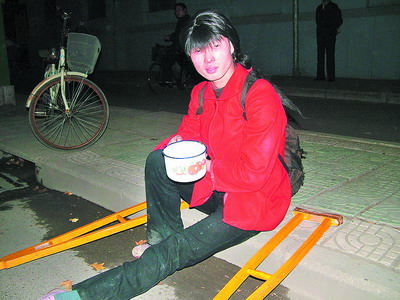
The reporter asked 'her' about the family circumstances and was told that
'she' had been begging for a year. Then an old lady came up and
pointed at the stub on her 'face': "This does not look like a
girl." When the reporter asked 'her' about her gender, 'she'
smiled and did not reply. A young man said that when he looked at the
young 'girl' on crutches, he saw that 'she' had Adam's apple. When
'she' saw that she was caught, she left and as soon as she got to the
corner, she turn and started running away.
- [031] UDN
Political Poll in Taiwan VOA headline: Taiwan President's Popularity Sinks to New Low,
but you won't get the full details there. So here are the full results from UDN
(in translation) (technical details: 1,088 telephone random sample conducted
October 7-8; the order of Q2-Q5 was randomly rotated by computer each
time):
Q1. Performance of President Chen Shui-bian. 25% satisfied; 54%
dissatisfied; 20% no opinion
Q2. Performance of Democratic Progressive Party. 24% satisfied; 56%
dissatisfied; 19% no opinion.
Q3. Performance of KMT (Nationalists). 35% satisfied; 43%
dissatisfied; 20% no opinion.
Q4. Performance of People First Party. 20% satisfied; 53%
dissatisfied; 27% no opinion.
Q5. Performance of Taiwan Solidarity Union. 19% satisfied; 46%
dissatisfied; 34% no opinion.
Q6. Does the DPP value public opinon? 30% yes; 45% no; 23% no opinion.
Q7. Does the DPP value social justice? 29% yes; 43% no; 26% no
opinion.
Q8. Is the DPP clean and uncorrupt? 27% yes; 49% no; 24% no
opinion.
Q9. Has the DPP lost its founding ideals? 61% yes; 14% no; 25% no
opinion.
Q10. Do you support the New DPP Movement initiated by Luo Wen-jia and others
to seek the core DPP values again? 38% yes; 26% no; 35% no opinion.
Q11. The New DPP Movement was started to reflect on the errors of the DPP?
Or for the election? 14% self-reflection; 58% election; 27% no
opinion.
Q12. Do you think that New DPP Movement will succeed? 12% succeed; 47%
fail; 40% no opinion.
Q13. In the Kaohsiung MRTS case, do you think there was government-business
collusion? 72% yes; 3% no; 24% no opinion.
Q14. In the Kaohsiung MRTS case, the President and the Inspector General
both said that they will investigate all the way. Do you think that
this case can be investigated all the way? 15% yes; 62% no; 22% no
opinion.
Q15. In the Kaohsiung BOT case, the Executive Yuan has decided to invest
NT$7.5 billion to become the largest shareholder. Do you support the
government's action? 35% yes; 44% no; 20% no opinion.
Wen
Wei Po reports by party affiliation on the same poll on the
president:
- DPP supporters: 67% satisfied; 24% dissatisfied
- KMT/PFP supporters: 87% dissatisfied
- independents: 23% satisfied; 44% dissatisfied
- [030] Newspaper
Reading For School Assignment Miss
Lee overheard a mother-daughter conversation about how a Hong Kong
elite school assigned the students to read the same news in five different
newspapers. Miss Lee surmised that this must be to teach students how
to compare the editorial positions and styles. It is a good thing to
teach critical thinking, but in Miss Lee's experience, it is difficult to
figure out the differences unless it is political news. Most of the
time, the newspapers have the same approach to regular news.
There was this news item in Hong Kong yesterday. In the briefest
sketch, a driver noticed a car at 645am on a Cheung Kwan O sidewalk with
damaged headlight and tire and an immobile person inside. The driver
called the police, who came and woke the man up. A breathalyzer test
found the man scoring 57 compared to the legal limit of 22. The man
was arrested for driving while intoxicated.
This news item did not appear in English-language South China Morning Post
and The Standard. It did not appear in the pro-Beijing Wen Wei Po and
Ta Kung Pao. The other newspapers (Apple Daily, Ming Pao, Sing Pao,
Sing Tao, Oriental Daily, The Sun) all had to dance gingerly. What is
going on?
(Ming Pao via Yahoo!
News) When the police found the man, his clothes were in
disarray. There was also stinking excrement inside the car, on
his jeans and the paper napkin next to him. The police tapped on the
door to tell him to come out. The man opened the door, got out and
promptly stepped on a pile of excrement on the ground.
This is not an easy story to write, since the right of the public to know,
the need not to commit libel and the sensibility of the reader must all be
considered. And this is a thoroughly apolitical story. As for
me, I was giggling over the contortions that the newspapers had to go
through. (Like, okay, so maybe you can't say that the pile of feces on
the ground was this man's creation because a DNA analysis had not been
performed yet!) As a lesson, this was good enough to illustrate the
points about media differences. If I were the student, this is the story I
would write about, and the teacher will flip out!
- [029] Body
Searches & Exercises This must be a slow news day (but it
shouldn't, given the following item), so Apple
Daily has trotted out another school scare story on the front
page. The story is about a 50-year-old female secondary school
physical education teacher. Whenever swimming classes take place, some
female students would claim that they were having their menstrual
period. This teacher would squeeze their behinds to make sure that
they were indeed wearing sanitary napkins. It got to the point where
some students would rather jump into the swimming pool than be groped. Those
students caught lying are punished by assuming the position of an arch
bridge for the period.


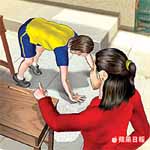
The usual number of medical experts was quoted about the psychological and
physical damages that may be caused by these actions. But why is this
story on the front page on a day when 18,000 perished in the earthquake in
Pakistan?
- [028] Miss
Taiwan Flees (Again) In the first year of the Miss Taiwan
beauty pageant, the winner was stripped of her title for spreading false
information. In the second year, the winner was stripped of her title
after going into hiding from debt collectors (see Taiwan
Times). This is the third year and the winner (劉子瑄)
has went into hiding and is thinking about abandoning her title.

What is it this time? (China
Times) There were matters such as her padded educational
resumé and alleged vote-buying. But it seems that her major issue was
the pressure of being publicly laughed at for her Taiwan accent and improper
usage of Chinese terms. Specifically, she and many of the other
competitors in the Miss Taiwan Beauty Pageant have been described as Hen Tai (很台, "you are very Tai [Taiwanese]") and
Taike (台客, "Taiwaners").
Here is her interview (China
Times) 「我從不認為自己的行為舉止很『台』,但我的內心的確非常『台』,因為我很『愛台灣』,而且我是出身台南人,這有錯嗎?爸爸認為我當選台姐後,不但沒有名利雙收,反而被批評到體無完膚,真的很不值得,才會希望我不如放棄頭銜,當一個平平凡凡的上班族就好了。」
(translation) "I don't think that my behavior was very 'tai'. In
my heart, I am very 'tai' because I 'love Taiwan.' Besides, I am from
Tainan. Is that so wrong? My father thinks that when I became
Miss Taiwan, I collected neither fame nor fortune but I was criticized to
death. He thinks that this is not worthwhile and therefore hopes
that I could abandon the title and become an ordinary white-collar
worker."
Here is some background for those terms. (Taiwan
Times) Actors and actresses speaking "Taiwanese Mandarin" usually land parts such as idiots, hillbillies or domestic maids, Chang said, while those speaking "Beijing Mandarin" get roles as leading men or women in love stories.
The stereotypes [are] that people in the south of the country speak Hoklo (more commonly known as Taiwanese) while those in the north speak Mandarin; those wanting to curse use Hoklo, but those wishing to offer compliments use Mandarin; and those chewing betel nut speak Hoklo, while those who wear a suit and tie speak Mandarin.
(TVBS)
Here are some of the short speeches made by Miss Taiwan competitors this
year:
「台灣小姐一定要會台語,那就獻醜了。有緣沒緣,大家來作伙,燒酒喝一杯,呼乾啦!呼乾啦!」
「社會蠻繁ㄇㄢˊ的,古典樂能讓你的心情放ㄙㄨㄥ。所以我覺得,古典ㄨㄟˋ它其實跟酒一樣,更耐人尋味。」
「目前在一家私人應召公司上班,今天很高興能夠來到這裡。」
「也是同樣接待貴賓宴客敦睦香蕉〈邦交〉,的台北圓山大飯店。」
「在過去總統大選是在陽明山,而這次的選美是在陽明山的中山樓,使的政治跟選美能夠並駕齊驅。」
With due respect, nothing is going to change
until the day when Miss Taiwan can stand up and say, "This is me and I
can do no other." She should also say "F*ck you and the
horse that you came on." There is nothing that she needs to be
apologetic about.
- [027] Chairman
Mao as Wedding Emcee. Nice job if you can get
it, but the requirements are stringent -- you have to look like Chairman Mao. (Nanfang
Daily) In the city of Changchun (China), the wedding ceremony
begins with the revolutionary song: "The east is red, the sun is
rising, China has a Mao Zedong ..." Then a "Chairman
Mao" enters the hall and said hello to the guests in Hunan
dialect. The man is a professional actor who has specialized in
Chairman Mao roles on the last 25 years. About 8 years ago, he played
emcee at the wedding of a friend's son. Since then, he has been
regularly employed. He hosts 5 to 6 weddings a month, at 500 RMB
each. During the October 1 golden weekend, he worked four
weddings. He made it a point to state that he is very careful about protecting
the image of Chairman Mao.

- [026] Guardian
Reporter Attacked
in Taishi Village. The source here is Boxun,
which is not always reliable. Anyway, if true, this will be a huge
international affair that the State Council cannot afford to ignore.
The one paragraph English-language release appeared at 1020pm, Saturday,
October 8. One hour later, you can read the translation of the
detailed Chinese item here: Last evening, Benjamin Joffe-Walt, a reporter
with The Guardian, arrived in Guangzhou with his assistant Mr. Chen to work
on the Taishi Village official recall story. Today, he went there
accompanied by the National People's Congress delegate Lu Banglie who has
been active in the case. By 7pm, Lu Banglie who did not intend to
enter the village had still not returned and Joffe-Walt could not be reached
by telephone either. The friend waiting outside the village was
concerned and telephoned villagers. At that moment, Benjamin Joffe-Walt
also sent a SMS to his British colleague: "Our car is being surrounded
and we are being attacked!" The villagers then told the friend:
"They are inside Taishi Village, being assaulted. The foreigner
is near death. It is pitiful. Please call for help!"
"The attackers are security personnel hired by the village party
secretary at 100 RMB per day. Their job is to assault all outsiders
and foreigners in the village! Every day, they drink alcohol, beat and
arrest people. This is black terror!"
Yesterday, Radio France's Abel Segrétin and South China Morning Post's Liu
Xiaoyin were assaulted by more than twenty people. More at The
Taishi Village Elections - (Chronology).
Addendum: Radio Free Asia via Boxun.
In the evening of October 8, the lawyer Guo Yan who represents several Taishi
village residents, received an SMS at 8pm-9pm about Lu Banglie and a
foreigner reporter being assaulted. Lu Banglie was more seriously
injured and is in Datong Hospital. At 11:38pm, Guo received a message
that told her about the names of the individuals who assaulted Lu and the
foreign reporter. There are no details about the extent of the
injuries, but it is said to be serious, "even fatal."
Another villager sent an SMS about how the foreigner has departed safely.
He was assaulted, fell into the banana field and then chased around.
At 1am on 10/9, the RFA reporter interviewed Jonathan Watts, who is the
Beijing-based reporter for The Guardian. Watts said: "I don't know the
details. I understand that he is safe and unhurt. That is the
information that I got when we spoke an hour ago. There was news that
he was assaulted, but he told me that he is unhurt. I am concerned
about him. Benjamin wanted to enter the village on 10/8, but he could
not get in and his car was surrounded by a group of people. He wanted
to call outside, but his phone was cut off."
- [025] "I'm
going to kill you if you take another photo!" (Nanfang
Daily) At 330pm on the afternoon of October 7, there was an
explosion at a Guangzhou factory. At 530pm, a Nanfang reporter and a
photographer were permitted by the police to enter the scene. When the
photographer began shooting, a man came out and grabbed him by the neck
saying "他妈的你们来采访干什么,别想搞我们的厂子"
("Why the fuck are you reporting this for? Don't mess around with
our factory." When the reporter explained that they had the
right, the man said, "你们有个屁权利!我就是卡你脖子,打你!"
You don't have any farting rights! I am going to strangle you and beat
you." Then the man grabbed the 50,000+ RMB camera and threw it on
the ground; he picked it up again and then threw it against the wall.
Then the man walked away.
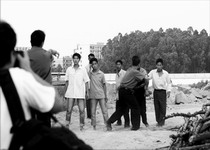

The mystery question: "Where were the police?" Police
officer 0377x9 was with the reporter and photographer the whole time and did
nothing. The photographer complained to police officer 0387x4, who
suggested the photographer to call 110 first. This was the response
provided by all the other police officers at the scene. So the
reporter called 110, and more police came to take the reporter and the
photographer back to the police station to file a complaint.
- [024] HELLO
7. (Ming Pao via Yahoo!
News) In Hong Kong, a car owner had the license plate number
"HE 1107." He made a modification to the license plate by
moving a space around to read "HE110 7" which looks like
"HELLO 7" at a quick glance. He was charged with violating
the law and fined HK$1,000. The car owner sighed: "The government
won't permit creativity ... it has no sense of humor."
- [023] Dirty
Looting in Taiwan. (Taipei
Times) The Taiwan Government Information Services took out a
full-page advertisement defending the Cabinet's proposal for a national communication commission (NCC).
The ad said the proposed commission would be a neutral body and avoid politics.
"I take full responsibility for the full-page newspaper advertisement that the GIO ran a couple of days ago," Yao said.
"But I admit that it was not appropriate for Chinese Nationalist Party [KMT] Chairman Ma's [Ying-jeou (馬英九)] name to be mentioned in the ad," Yao said.
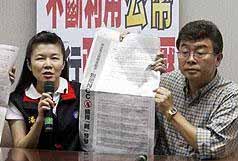
The Chinese language used in the ad is actually interesting.
(China Times via Yahoo!
News) The headline was this:
拜託馬主席懸崖勒馬!別把NCC搞得『贓』兮兮
(translation: Chairman Ma, please rein the horse
before plunging down the steep cliff! Please do not corrupt/dirty the
NCC). Note how I had to use "corrupt/dirty." In
ordinary usage, 'dirty' is 髒.
In this case, the word was replaced by the similar-sounding 贓
which means 'loot.' Chairman Ma's response: "歎為觀止!真的很像政黨廣告!"
(translation: An awesome sight! It really looks like a political party ad!)
- [022] That
Japanese History School Textbook. (Xinhua)
A Japanese textbook criticized for distorting history will be used by only 0.4 percent of junior high school students nationwide, according
to a government survey published on Wednesday.
The textbook, compiled by the Japanese Society for History Textbook Reform and published by Fusosha Publishing Inc, will be used by 4,912 students from next year, the Ministry of Education, Culture, Sports, Science and Technology said.
To my mind, this is hardly the point. In The Roots of Anti-Japanese Feelings in China,
I wrote: "The ultimate objective is to revise history, and you don't need to own 100% of
the history book market for this. By staking yourself out on the extreme
right, you are subtly forcing the other major publishers to move towards you,
especially with the uncertainty that you have injected through your 'serious'
academic discussions. This is playing the 'fair and balanced'
card."
- [021] Jinxed.
Lately, my track record has been horrendous. I mean, truly horrendous.
- I explain The Importance of The Taishi Elections,
and the whole campaign has been totally shut down.
- I praise Yannan Forum,
and the website gets shut down (see link).
- I praise Xici Hutong,
and the website goes down this week.
At this point, an endorsement from this blogger is the kiss of death.
I just praised Chen Guidi and Wu Chuntao at Super Girl as Heroine.
What will that do?
P.S. In the United States, there are the Friday 5pm horrors, when bad
news get released at the end of the business week. In China, this is
the October 1 Golden Week holidays. Is that why everything is
happening this week?
- [020] Blogger's
Advantage When Justin Mitchell wrote about A
Question of Survey Abuse
in The Standard, he quoted Robert Chung of Hong Kong University, Michael DeGolyer
of Hong Kong Baptist University and a third person who is a blogger with no
formal professional affiliation. Whereas the first two esteemed
professionals would probably not care to comment on all the junk surveys
around, the blogger apparently has no compunction (see The RAHK Public Opinion Poll and
The
Global Competitiveness Report). Does freedom of speech have
pre-requisites (such as absence of professional pressure)? Maybe you
think something is quite wrong, but you don't have all the information and
you wouldn't want to get into a major confrontation over that. Or
maybe you have better things to do with your time? But the blogger
don't have those concerns. From Janis Jopin in "Me and Bobby
McGee" -- "Freedom's just another word for nothing left to lose."
- [019] Super
Girls Live. This is an excerpt from the Chengdu performance on
October 1. (Chengdu Evening News via Wenxue
City) Whenever a Super Girl sang, fans of other Super Girls
would yell and throw stuff. When Li Yuchun got on stage, a male fan of
Zhang Liangyin yelled: "Homosexual, get off the stage!" He
was immediately surrounded by seven or eight Yu fans who threw him on the
ground and poured water on his head. Other Liang fans came to support
him, and slapped the Yu fans around, leaving them red-faced and in
tears. Meanwhile other male Yu fans joined in ... anyway, it was a
mess. He Jie was the one who sang the longest, and so she received the
most abuse. As soon as she started to sing, the Liang fans began
chanting Zhang Liangyin's name. The He fans got angry and threw the
fluorescent sticks at the Liang fans, and then there was another messy fight
...

Hmm ... this does not sound like a harmonious society, eh?
- [018] How
To Tell Chinese From Japanese. (ChineseNewsNet)
On December 22, 1941 (fifteen days after the Japanese attack on Pearl
Harbor), Life magazine published this guide for Americans on how to tell
Chinese 'friends' from Japanese 'enemies.'
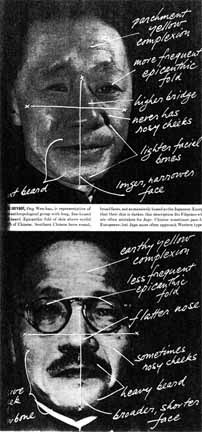
This is hogwash, of course. From AllLookSame.com:
I’ve always thought that it was one of those urban myths that you can tell different Asians apart. Especially if I can’t see what they are wearing, I don’t think that I can tell them apart. And, I’m an Asian myself. I’ve been living in the US for over 15 years and I’ve heard some people tell me I definitely look Japanese, while others thought that I don’t at all. Some people boastfully claim that they can tell the difference no problem, while others quietly admit that they can’t. Even with those who claim they can, is it really true that they can? Maybe there is something to be said about someone saying “You guys all look the same!” Or, maybe they just don’t know any
better.
You can go there and take the test at AllLookSame.com.
I got 8 out of 18. The average score is 7. By random chance alone,
one expects to get 6 out of 18. Good luck!
- [017] The
Google Map of Taiwan. You can read about this at Bloomberg:
"Google Inc., the most-used Internet search engine, said its description of Taiwan as a province of China is consistent with international naming conventions such as those followed by the United Nations.
Google faces protests from Taiwan's government because of the description, which is used on its map service. The island's foreign ministry has instructed its U.S. representative office to ask Google to correct the listing."
Why pick on Google? There is a more prominent website that Taiwan's
government ought to get corrected as indicated near the bottom of this previous post, The
Map of China. Where is the backbone of the people of Taiwan? Where won't they
hit the streets to demonstrate? Why won't they boycott and condemn the
people behind that website? Why won't they lay siege to the Taipei
office of that website's owner? Why won't they pelt the
representatives of that website's owner with rotten eggs? That website is the root of all
evil. The day when that website corrects its map, Google, Yahoo! and
everybody else will fall in line. Meanwhile, stop wasting everybody's
time ... Until the root cause is addressed, everything else is just
public relations.
Additional reading: The curious case of Google’s Map Service
Stephen Frost, CSR Asia
- [016] Prominent
Blog Sites. At the New Media Workshop, Journalism and Media
Studies Centre, the University of Hong Kong, the question is "What
is Blog style?" A list of prominent blog sites is
provided: Boing Boing, Xiaxue, Crooks and Liars, Slashdot, Wonkette,
Powerline and one Hong Kong-based blog. Question: What do you see that
is common, and what kind of elements are used that make it more effective
and compelling? Well, who am I to say? I do know that in all
likelihood, only one of those so-called prominent blogs will refer to that particular
page and proclaim either ignorance or knowledge. And you are reading
that blog at this very moment ...
- [015] Media
Hit Parade in Taiwan. (Tianya
Club) For the first six months of the year, Apple Daily led in
the newspaper category with 527 illegal advertisements, leaving number 2
Liberty Times in the dust with only 47. In the magazine category, Next
Weekly (which is Apple Daily's sister publication in the Next Media Group)
led with 165 illegal advertisements, far ahead of number 2 China Times Weekly with
only 44. In the television category, CTS's shopping channel (廣通購物)
led with 329 illegal advertisements. According to the Taipei City
Health Department, about 30% of the illegal advertisements were about weight loss
and dieting products, often with celebrity endorsements. These illegal
advertisements have been fined a total of NT$27.5 mllion. But if the
media are making more money than that, how shall the practice ever be stopped?
The fines become a business expense instead of an impediment.
- [014] Tianxian
MM Hearts China. So what is Tianxian MM? (see previous
post The
Real Story of Tianxian MM (天仙MM))
A brilliant public relations hype? Or the genuine article?
Temperamentally, I lean towards the former thesis, and with a great deal of
admiration. The latest twist is the following photo on National Day
(via Wenxue
City): The young Xiang woman known as Erma Yinuo was unhappy:
"Why do you people only like the photos of me feeding pigs, herding
sheep, selling apples, spreading fertilizers, picking peppers and sewing
shoes? Am I not good enough to wave the national flag? Do you
want rural peasants to be as dumb as possible ...?"

- [013] Lake
Yangcheng Crabs This is October, the season for the Lake Yangcheng
crab. Thanks to an Apple Daily exposé based upon incorrect safety
standards, crab sales took a 20%-40% plunge (see Yahoo!
News) in Hong Kong. (Ming
Pao via Yahoo! News) To reassure consumers, the Environment
and Food Bureau tested a sample of 21 crabs and pronounced that there were
no problems detected in the chemical and microbiological tests. Is it
safe?
What is the probability that there are no problems? This is a sample
of size 21 in which no problems were found. But there is sampling
error in the sense that a different sample of 21 crabs may indeed have
problems. So how confident are we in the 0/21 result? Following
the method given in C.J. Clopper and E.S. Pearson, "The use of confidence or fiducial limits illustrated in the case of the binomial." Biometrika 26:404-413,
1934, we can calculate a 95% confidence in which the true incidence of
health threats likely lies.
If you take a sample of size one and find nothing, then the true incidence
of health threats is likely between 0% and 95%; this is not very
reassuring. That is why no one takes a sample of one and consider
the response to be definitive.
If you take a sample of one hundred crabs and find nothing, then the true
incidence of health threats is likely between between 0% and 2.95%.
That is more reassuring. Unfortunately, it takes a lot of time and
resources to analyze 100 crabs. So you see the trade-off between
precision and resources.
In this case, a sample of 21 crabs was taken and no problems were found; the
true incidence of health threats is likely to be between 0% and
13.29%. Are you reassured? Well, I am not. This is just a
media show for the statistically illiterate.
- [012] Southern Barbarians.
(The Sun via Yahoo!
News) 81-year-old former High Court judge Miles Henry
Jackson-Lipkin and his barrister wife, Lucille Yun Shim Jackson-Lipkin, 80,
were charged in court for welfare fraud. The two allegedly claimed
they owned no property, vehicle or investment as of February 1, 2004, and
that their bank deposits and cash totalled $2,000. As a result, each
received amounts to the tune of HK$7,000 per month from the
government. After the court appearance, the judge waved a card reading
"southern barbarians" (南蠻)
to the paparazzis from his car. The term is a stylized insult of
southern Chinese usually used by the northern Chinese. In reply, the
southern Chinese has the corresponding term of insult for "northern
barbarians" (北狄).
Since this is EastSouthWestNorth, you might as well as term the complete
list: 北狄南蠻東夷西戎.
East, South, West, North -- you are all just barbarians and the only
civilized people are the English gentlemen in top hats andd
three-piece-suits who are welfare cheats.

- [011] Chutzpah,
Part I. An explanation was offered about the results in The
Global Competitiveness Report. Ranked at the top of the table is
the world's greatest economic power, the United States of America. But
the GCI is about global competitiveness, which may or may not have anything
to do with the current size of the economy. Yet, when one looks at the
'hard data' such as government surplus/deficit, national savings rate,
government debt, cellular mobile subscribers per 100 inhabitants, Internet
users per 10,000 inhabitants, etc, one would have to question how the USA
could be so highly ranked. The explanation is Chutzpah,
the quality of audacity, for good or for bad. The Americans may not do
too well on the hard data, but when asked for personal opinions, they think
that their country is perfect. It is about arrogance, audacity,
presumptuousness, cojones, gumption, hubris, gall, nerve, effrontery,
etc. Meanwhile, people who are culturally more reserved and humble are screwed in
the GCR.
- [010] Chutzpah,
Part II. In the matter of Li Ao's speeches and press
conferences in China, there have been numerous essays written to attack him
from every which angle. One line of attack is that Li Ao is an
insignificant intellectual. Yet, the fact is that Li Ao got a huge
amount of attention this time, whereas none of the people who penned those
attack essays would have been invited to deliver speeches; even if they
were,
no one would have shown up or paid any attention.
At the Hong Kong press conference, Li Ao said (via Phoenix
TV): "Let me offer the example of American president
Roosevelt. During an election, he said: 'You can't beat something with
nothing.' ... Therefore, these people who are sour, jealous and
resentful will always say that. I mean those people who write hurtful
thinks about me. On the bright side, it is quite futile, because they
are nothing whereas I am something." Read Part I for the
definition of Chutzpah. It is also true that none of the attack
essayists can speak those words without seeming to be ridiculous.
- [009] Trademark
Infringement. Qualitex Co. v. Jacobson Products Co, U.S. Supreme Court
(1995): "[T]rademark law, by preventing others from copying a source-identifying mark, 'reduce[s] the customer's cost's of shopping and making purchasing decisions,' for it quickly and easily assures a potential customer that the this item -- the item with this mark -- is made by the same producer as other similarly marked items that he or she liked (or disliked) in the past. At the same time, the law helps assure a producer that it (and not an imitating competitor) will reap the financial, reputation-related rewards associated with a desirable product."
The test for trademark infringement asks whether the ordinary buyer -- not looking for subtle differences or fine details -- would believe both products (or services) came from the same
source, using factors such as similarity of the conflicting marks; degree of care likely to be used by purchasers in selecting the goods;
evidence of actual confusion; etc.
Thus, if the Republican and Democratic parties dominate American politics,
there is an advantage to set up a new Democratic Republican Party but that
is apt to be challenged for trademark infringement. In Taiwan, there
seems to be a pattern of symmetrical registration attempts. (Ta
Kung Pao) When an application was made for the Grand Alliance
To Protect China (保衛中華大同盟),
another one was made for the Grand Alliance To Protect Taiwan (保護台灣大聯盟).
The Taiwan Kuomintang (台灣國民黨)
was announced in July, and the Chinese Democratic Progressive Party (中國民進黨)
will debut this month. If both applications are accepted, then this is
nothing but a freak show in which the entities are used as tools to erode the original trademarks. If one application is accepted and the other
is rejected, then there will be a political fallout about that asymmetrical
decision. Therefore, it is best that both get rejected.
- [008] Sepember
Website Statistics. For the month of September, here are my combined
website statistics:
- Number of hits (including htm, pdf, jpg, gif, wmv, xml files) = 1,806,876
- Number of page views (htm files only) = 325,513
- Number of user sessions (IP numbers within 30 minutes) = 237,316
- Average time spent per user session = 9 minutes 39 seconds
- Bandwidth consumption = 27,372,643 kilobytes
- [007] The
Non-Evolution of Public Opinion. The relevant previous post is
Chinese History, Creationism and the War in Iraq,
in which I expressed my pessimism about how laying the 'truth' before the
eyes of the people will shape their opinions. In Washington
Post, Scott Keeter of Pew Research filled out more data:
Wondering how the American people's opinions on the subject have been affected by the public debate, the Pew Research Center recently took a look at polls conducted by our organization, Gallup and many others over the last 20 years. What we found was that the public has relatively settled views on evolution and creationism -- perhaps surprisingly, roughly equal numbers accept one or the other. Among those who endorse evolution, however, many believe that a supreme being had a hand in the process. Moreover, most Americans want students to be exposed to a diversity of viewpoints on the issue. Public opinion on all of these points has been steady over the past two decades.
Regardless of how questions are posed, polls consistently find that 40 to nearly 50 percent of the public accepts a biblical creationist account of life's origins, while slightly more accept the idea of evolution. For example, in a recent Pew poll, 42 percent agreed that "humans and other living things have existed in their present form since the beginning of time," while 48 percent believe that "humans and other living things have evolved over time."
...
But here's the kicker: Although neither evolution nor creationism is accepted by a sizable majority, upwards of two-thirds of the public over the past 20 years has supported teaching both accounts of the origins of life. Even among proponents of natural selection, a majority wants students to be exposed to creationism. And a large minority of Americans -- around 40 percent in both the Gallup and Pew polls -- says that creationism should be taught instead of evolution.
ON a scale of 0 to 10, with 0 meaning not at all influential and 10 meaning
extremely influential, how much do you think the views of the majority have
on the decisions of elected officials in Washington? Answer: 4.5.
How much influence do you think the view of the majority of Americans should
have on decision of elected officials in Washington? Answer: 8.0.
So please get this straight: majority opinion means diddly in America in
practice. The rulers are smarter than the people and know what is best
for them. And the people accept that arrangement.
Also this: "Generally, do you think the United States should support
the pro-democracy movement in China, or do you think this is an internal
matter and the United States should stay out of it?" 55% thought
the US should "stay out of it," while only 35% thought the US
should support China's pro-democracy movement.
- [005] Happy
National Holiday! If you attempt to reach the Yannan forum,
the following message appears: "Yannan Reorganization Notice: As
of today, Yannan is being totally renovated. You will be notified
later when the website will reopen. We deeply apologize for any
inconvenience. We wish everybody a happy national holiday!
Yannan. 2005-9-30."

- [004] Spam
Spam Spam Spam ... You know, there was that Monty Python
skit. Anyway, the following was reported at the Hong
Kong Bloggers Group at Google. This is a web survey at MingPao
(in Hong Kong) and the question is, "Do you agree that male homosexuals
between the ages of 16 to 21 have the right to engage in sexual activity?
- Agree: 515,399 votes (7.5%)
- Disagree: 6,374,232 votes (92.6%)
- No opinion: 722 votes (0.0%)
With due respect, the total population of Hong Kong is under 7
million. We need to have every single person, age 0+, in order to come
up with these survey results. Duh, this must be a burning issue with
everyone, right? So did you vote there ... ? I haven't.
I've never even heard of it; if I did, I would have rushed over, wrote a script
and voted 100,000 times (or a lot more, since I have broadband and I know
how to fudge IP numbers) for "AGREE."
- [003] Cheating
In Exams. In the Qing dynasty, scholars took their
examinations in private rooms where they were given a subject, a brush and
paper to expound on their understanding. These examinations rely
hugely on the scholars' understanding of the classics, which they are
supposed to have memorized since age three (or some such). (6Park)
In Tianjian, a complete set of cheating tools from the Qing dynasty has been
discovered. There are nine volumes, measuring 4.5 cm long, 3.8
centimeters wide and 0.5 centimeters thick. More than 100,000 words
had been copied in small print and that can be hidden in a pair of men's
shoes.

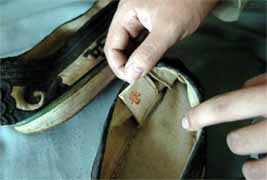
Today, of course, we have better technology as the material could be sent
via mobile phones.
- [002] And
Now For Something Completely Different ... The previous
comment Another
Chinese Democracy Advocate In The News may just be complete wrong,
as ChineseNewsNet
has an account from the principal himself. Here is the account from Ni Yuxian (倪育賢),
the Chairman of the Party for Democracy and Freedom in China. During
1998-1999, an individual named Yang Guojun used a false name and pretended
to be a democracy activist to work with Ni Yuxian. In 2002, Yang's
daughter was assaulted by her father after telling her uncle in Shanghai
about being sexually abused by her father. She received 17 stitches at
the hospital. Yang was arrested, and Ni posted US$5,000 to bail her
out. The court issued an order of protection against the father and
Yang's two daughters were placed with an Afro-African foster family.
But the two daughter could not take it, and the Child Welfare Department
eventually placed the children with Ni's family.
In 2003, Yang came to Ni's home and stole some documents. Yang's
daughter saw him and turned him in. Yang was sent to prison for 6
months. Ni then decides that the Child Welfare Department should take
custody of the children. Since Yang is applying for permanent
residency in the United States and cannot afford to have a criminal record,
he has coerced this two daughters to claim sexual assaults by Ni. Yang
then sent out faxes to the Chinese-language media under the name of Tong to
inform everyone about the sexual assault charges against Ni.
The Chinese-language media are confused by these conflicting accounts.
Not to fear, for Ni explains: "He is obviously a Communist co-conspirator!
I think that the person who sent the fax is a Communist. And I know
that he is going to get a big sum of money from this."
- [001] True
Newspaper Circulation Figures in China. There was something in
an article about China Youth Daily that I read several days ago, but I have
lost the link. Anyway, it was anecdotal material so the source
("an anonymous industry insider") is not important. However,
the situation seems to make sense. At issue is the true circulation
figures for the official newspapers in China. First of all, Guang Ming
Daily is alleged to have circulation figures that are so low that they
cannot conceivably be shown. That newspaper is as good as dead, but it
continues to be published because no leader wants to do the mercy killing.
What about the venerable People's Daily? The circulation is indeed in
the millions (in a technical sense), because many government departments are
forced to subscribe to it. However, this article refers to a technical
loophole.
For example, a government department is forced to get a subscription and it
does so. There is no technical definition for 'subscription', so many
departments have taken this to mean the minimum subscription period of one
month. Thus, if they subscribe to one month out of the year, they have
technically fulfilled the requirement. In the month of January, the
People's Daily may indeed have millions of subscribers. Come February,
who knows what the attrition is?
Archives





































